Itinerary
Dublin is making a comeback. The decade-long “Celtic Tiger” boom era was quickly followed by the Great Recession, but The Recovery has finally taken a precarious hold. For visitors, this newer and wiser Dublin has become one of western Europe’s most popular and delightful urban destinations. Whether or not you’re out to enjoy the old or new Dublin, you’ll find it a colossally entertaining city, all the more astonishing considering its intimate size.It is ironic and telling that James Joyce chose Dublin as the setting for his famous Ulysses, Dubliners, and A Portrait of the Artist as a Young Man because it was a “center of paralysis” where nothing much ever changed. Which only proves that even the greats get it wrong sometimes. Indeed, if Joyce were to return to his once-genteel hometown today—disappointed with the city’s provincial outlook, he left it in 1902 at the age of 20—and take a quasi-Homeric odyssey through the city (as he so famously does in Ulysses), would he even recognize Dublin as his “Dear Dirty Dumpling, foostherfather of fingalls and dotthergills”?For instance, what would he make of Temple Bar—the city’s erstwhile down-at-the-heels neighborhood, now crammed with cafés and trendy hotels and suffused with a nonstop, international-party atmosphere? Or the simple sophistication of the open-air restaurants of the tiny Italian Quarter (named Quartier Bloom after his own creation), complete with sultry tango lessons? Or of the hot–cool Irishness, where every aspect of Celtic culture results in sold-out theaters, from Once, the cult indie movie and Broadway hit, to Riverdance, the old Irish mass-jig recast as a Las Vegas extravaganza? Plus, the resurrected Joyce might be stirred by the songs of Hozier, fired up by the sultry acting of Michael Fassbender, and moved by the award-winning novels of Colum McCann. As for Ireland’s capital, it’s packed with elegant shops and hotels, theaters, galleries, coffeehouses, and a stunning variety of new, creative little restaurants can be found on almost every street in Dublin, transforming the provincial city that suffocated Joyce into a place almost as cosmopolitan as the Paris to which he fled. And the locals are a hell of a lot more fun! Now that the economy has finally turned a corner, Dublin citizens can cast a cool eye over the last 20 crazy years. Some argue that the boomtown transformation of their heretofore-tranquil city has permanently affected its spirit and character. These skeptics (skepticism long being a favorite pastime in the capital city) await the outcome of “Dublin: The Sequel,” and their greatest fear is the possibility that the tattered old lady on the Liffey has become a little less unique, a little more like everywhere else.Oh ye of little faith: the rare ole gem that is Dublin is far from buried. The fundamentals—the Georgian elegance of Merrion Square, the Norman drama of Christ Church Cathedral, the foamy pint at an atmospheric pub—are still on hand to gratify. Most of all, there are the locals themselves: the nod and grin when you catch their eye on the street, the eagerness to hear half your life story before they tell you all of theirs, and their paradoxically dark but warm sense of humor. It’s expected that 2016 will be an extra-special year in the capital, as centenary celebrations of the fateful 1916 Easter Rising will dominate much of the cultural calendar.
Day programme:
Start your journey in the heart of Dublin, Ireland’s vibrant capital, with a two-night stay in a luxurious hotel.Set on the banks of the River Liffey, Dublin was founded by the Vikings who named the city Dubh Linn, which means ‘Black Pool’ after the tidal pool that formed where the River Poddle met the Liffey. The city is magnificent with Georgian architecture, grand squares and historic monuments, and is steeped in culture and oozes charisma with a touch of hedonism.
Dublin is making a comeback. The decade-long “Celtic Tiger” boom era was quickly followed by the Great Recession, but The Recovery has finally taken a precarious hold. For visitors, this newer and wiser Dublin has become one of western Europe’s most popular and delightful urban destinations. Whether or not you’re out to enjoy the old or new Dublin, you’ll find it a colossally entertaining city, all the more astonishing considering its intimate size.It is ironic and telling that James Joyce chose Dublin as the setting for his famous Ulysses, Dubliners, and A Portrait of the Artist as a Young Man because it was a “center of paralysis” where nothing much ever changed. Which only proves that even the greats get it wrong sometimes. Indeed, if Joyce were to return to his once-genteel hometown today—disappointed with the city’s provincial outlook, he left it in 1902 at the age of 20—and take a quasi-Homeric odyssey through the city (as he so famously does in Ulysses), would he even recognize Dublin as his “Dear Dirty Dumpling, foostherfather of fingalls and dotthergills”?For instance, what would he make of Temple Bar—the city’s erstwhile down-at-the-heels neighborhood, now crammed with cafés and trendy hotels and suffused with a nonstop, international-party atmosphere? Or the simple sophistication of the open-air restaurants of the tiny Italian Quarter (named Quartier Bloom after his own creation), complete with sultry tango lessons? Or of the hot–cool Irishness, where every aspect of Celtic culture results in sold-out theaters, from Once, the cult indie movie and Broadway hit, to Riverdance, the old Irish mass-jig recast as a Las Vegas extravaganza? Plus, the resurrected Joyce might be stirred by the songs of Hozier, fired up by the sultry acting of Michael Fassbender, and moved by the award-winning novels of Colum McCann. As for Ireland’s capital, it’s packed with elegant shops and hotels, theaters, galleries, coffeehouses, and a stunning variety of new, creative little restaurants can be found on almost every street in Dublin, transforming the provincial city that suffocated Joyce into a place almost as cosmopolitan as the Paris to which he fled. And the locals are a hell of a lot more fun! Now that the economy has finally turned a corner, Dublin citizens can cast a cool eye over the last 20 crazy years. Some argue that the boomtown transformation of their heretofore-tranquil city has permanently affected its spirit and character. These skeptics (skepticism long being a favorite pastime in the capital city) await the outcome of “Dublin: The Sequel,” and their greatest fear is the possibility that the tattered old lady on the Liffey has become a little less unique, a little more like everywhere else.Oh ye of little faith: the rare ole gem that is Dublin is far from buried. The fundamentals—the Georgian elegance of Merrion Square, the Norman drama of Christ Church Cathedral, the foamy pint at an atmospheric pub—are still on hand to gratify. Most of all, there are the locals themselves: the nod and grin when you catch their eye on the street, the eagerness to hear half your life story before they tell you all of theirs, and their paradoxically dark but warm sense of humor. It’s expected that 2016 will be an extra-special year in the capital, as centenary celebrations of the fateful 1916 Easter Rising will dominate much of the cultural calendar.
Day programme:
This morning your local guide will help you discover the history and charm of Dublin on a walking tour. See The Mansion House, the official residence of Dublin’s Lord Mayor, Dublin Castle, which was constructed in the 13th century on the site of a Viking Settlement, and the old Post Office, the heart of Dublin’s history and culture for more than 800 years. You will also see 19th century Fitzwilliam Square, St. Stephen’s Green Park, the Molly Malone statue, the old Parliament House and City Hall. Freechoice: Choose how you want to conclude your morning exploration with Scenic Freechoice:Historical Ireland: Discover Dublin’s fascinating past on a guided tour: learn about the Irish Revolution, ‘the Irish War of Independence’, a decade long conflict between the British state and Irish republican guerrillas and visit the EPIC – The Irish Emigration Museum to gain a deep understanding of what it means to be Irish.Guinness Storehouse: Visit the Guinness Storehouse and factory to learn how this famous brew is made. After your guided tour, learn how to pull the perfect pint and enjoy a tasting from the 7th floor, which has a spectacular vantage point overlooking the city of Dublin.
Dublin is making a comeback. The decade-long “Celtic Tiger” boom era was quickly followed by the Great Recession, but The Recovery has finally taken a precarious hold. For visitors, this newer and wiser Dublin has become one of western Europe’s most popular and delightful urban destinations. Whether or not you’re out to enjoy the old or new Dublin, you’ll find it a colossally entertaining city, all the more astonishing considering its intimate size.It is ironic and telling that James Joyce chose Dublin as the setting for his famous Ulysses, Dubliners, and A Portrait of the Artist as a Young Man because it was a “center of paralysis” where nothing much ever changed. Which only proves that even the greats get it wrong sometimes. Indeed, if Joyce were to return to his once-genteel hometown today—disappointed with the city’s provincial outlook, he left it in 1902 at the age of 20—and take a quasi-Homeric odyssey through the city (as he so famously does in Ulysses), would he even recognize Dublin as his “Dear Dirty Dumpling, foostherfather of fingalls and dotthergills”?For instance, what would he make of Temple Bar—the city’s erstwhile down-at-the-heels neighborhood, now crammed with cafés and trendy hotels and suffused with a nonstop, international-party atmosphere? Or the simple sophistication of the open-air restaurants of the tiny Italian Quarter (named Quartier Bloom after his own creation), complete with sultry tango lessons? Or of the hot–cool Irishness, where every aspect of Celtic culture results in sold-out theaters, from Once, the cult indie movie and Broadway hit, to Riverdance, the old Irish mass-jig recast as a Las Vegas extravaganza? Plus, the resurrected Joyce might be stirred by the songs of Hozier, fired up by the sultry acting of Michael Fassbender, and moved by the award-winning novels of Colum McCann. As for Ireland’s capital, it’s packed with elegant shops and hotels, theaters, galleries, coffeehouses, and a stunning variety of new, creative little restaurants can be found on almost every street in Dublin, transforming the provincial city that suffocated Joyce into a place almost as cosmopolitan as the Paris to which he fled. And the locals are a hell of a lot more fun! Now that the economy has finally turned a corner, Dublin citizens can cast a cool eye over the last 20 crazy years. Some argue that the boomtown transformation of their heretofore-tranquil city has permanently affected its spirit and character. These skeptics (skepticism long being a favorite pastime in the capital city) await the outcome of “Dublin: The Sequel,” and their greatest fear is the possibility that the tattered old lady on the Liffey has become a little less unique, a little more like everywhere else.Oh ye of little faith: the rare ole gem that is Dublin is far from buried. The fundamentals—the Georgian elegance of Merrion Square, the Norman drama of Christ Church Cathedral, the foamy pint at an atmospheric pub—are still on hand to gratify. Most of all, there are the locals themselves: the nod and grin when you catch their eye on the street, the eagerness to hear half your life story before they tell you all of theirs, and their paradoxically dark but warm sense of humor. It’s expected that 2016 will be an extra-special year in the capital, as centenary celebrations of the fateful 1916 Easter Rising will dominate much of the cultural calendar.
Day programme:
Today you will travel to Killarney, stopping along the way to visit the 600-year-old Blarney Castle. Explore the castle ruins and see the legendary ‘Stone of Eloquence’, more commonly known as the Blarney Stone. Legend says if you kiss it, you will receive the ‘gift of the gab’. Over the years, famous people such as Sir Winston Churchill, Ronald Raegan and Mick Jagger have puckered up to the ancient stone. Afterwards, continue to Killarney for a two-night stay, a charming town nestled in a valley surrounded by Ireland’s highest mountain range, the McGillycuddy Reeks.
Edinburgh is to London as poetry is to prose, as Charlotte Brontë once wrote. One of the world’s stateliest cities and proudest capitals, it’s built—like Rome—on seven hills, making it a striking backdrop for the ancient pageant of history. In a skyline of sheer drama, Edinburgh Castle watches over the capital city, frowning down on Princes Street’s glamour and glitz. But despite its rich past, the city’s famous festivals, excellent museums and galleries, as well as the modern Scottish Parliament, are reminders that Edinburgh has its feet firmly in the 21st century.Nearly everywhere in Edinburgh (the burgh is always pronounced burra in Scotland) there are spectacular buildings, whose Doric, Ionic, and Corinthian pillars add touches of neoclassical grandeur to the largely Presbyterian backdrop. Large gardens are a strong feature of central Edinburgh, where the city council is one of the most stridently conservationist in Europe. Arthur’s Seat, a mountain of bright green and yellow furze, rears up behind the spires of the Old Town. This child-size mountain jutting 822 feet above its surroundings has steep slopes and little crags, like a miniature Highlands set down in the middle of the busy city. Appropriately, these theatrical elements match Edinburgh’s character—after all, the city has been a stage that has seen its fair share of romance, violence, tragedy, and triumph.Modern Edinburgh has become a cultural capital, staging the Edinburgh International Festival and the Fringe Festival in every possible venue each August. The stunning Museum of Scotland complements the city’s wealth of galleries and artsy hangouts. Add Edinburgh’s growing reputation for food and nightlife and you have one of the world’s most beguiling cities.Today the city is the second most important financial center in the United Kingdom, and the fifth most important in Europe. The city regularly is ranked near the top in quality-of-life surveys. Accordingly, New Town apartments on fashionable streets sell for considerable sums. In some senses the city is showy and materialistic, but Edinburgh still supports learned societies, some of which have their roots in the Scottish Enlightenment. The Royal Society of Edinburgh, for example, established in 1783 “for the advancement of learning and useful knowledge,” remains an important forum for interdisciplinary activities.Even as Edinburgh moves through the 21st century, its tall guardian castle remains the focal point of the city and its venerable history. Take time to explore the streets—peopled by the spirits of Mary, Queen of Scots; Sir Walter Scott; and Robert Louis Stevenson—and pay your respects to the world’s best-loved terrier, Greyfriars Bobby. In the evenings you can enjoy candlelit restaurants or a folk ceilidh (pronounced kay-lee, a traditional Scottish dance with music), though you should remember that you haven’t earned your porridge until you’ve climbed Arthur’s Seat. Should you wander around a corner, say, on George Street, you might see not an endless cityscape, but blue sea and a patchwork of fields. This is the county of Fife, beyond the inlet of the North Sea called the Firth of Forth—a reminder, like the mountains to the northwest that can be glimpsed from Edinburgh’s highest points, that the rest of Scotland lies within easy reach.
Edinburgh is to London as poetry is to prose, as Charlotte Brontë once wrote. One of the world’s stateliest cities and proudest capitals, it’s built—like Rome—on seven hills, making it a striking backdrop for the ancient pageant of history. In a skyline of sheer drama, Edinburgh Castle watches over the capital city, frowning down on Princes Street’s glamour and glitz. But despite its rich past, the city’s famous festivals, excellent museums and galleries, as well as the modern Scottish Parliament, are reminders that Edinburgh has its feet firmly in the 21st century.Nearly everywhere in Edinburgh (the burgh is always pronounced burra in Scotland) there are spectacular buildings, whose Doric, Ionic, and Corinthian pillars add touches of neoclassical grandeur to the largely Presbyterian backdrop. Large gardens are a strong feature of central Edinburgh, where the city council is one of the most stridently conservationist in Europe. Arthur’s Seat, a mountain of bright green and yellow furze, rears up behind the spires of the Old Town. This child-size mountain jutting 822 feet above its surroundings has steep slopes and little crags, like a miniature Highlands set down in the middle of the busy city. Appropriately, these theatrical elements match Edinburgh’s character—after all, the city has been a stage that has seen its fair share of romance, violence, tragedy, and triumph.Modern Edinburgh has become a cultural capital, staging the Edinburgh International Festival and the Fringe Festival in every possible venue each August. The stunning Museum of Scotland complements the city’s wealth of galleries and artsy hangouts. Add Edinburgh’s growing reputation for food and nightlife and you have one of the world’s most beguiling cities.Today the city is the second most important financial center in the United Kingdom, and the fifth most important in Europe. The city regularly is ranked near the top in quality-of-life surveys. Accordingly, New Town apartments on fashionable streets sell for considerable sums. In some senses the city is showy and materialistic, but Edinburgh still supports learned societies, some of which have their roots in the Scottish Enlightenment. The Royal Society of Edinburgh, for example, established in 1783 “for the advancement of learning and useful knowledge,” remains an important forum for interdisciplinary activities.Even as Edinburgh moves through the 21st century, its tall guardian castle remains the focal point of the city and its venerable history. Take time to explore the streets—peopled by the spirits of Mary, Queen of Scots; Sir Walter Scott; and Robert Louis Stevenson—and pay your respects to the world’s best-loved terrier, Greyfriars Bobby. In the evenings you can enjoy candlelit restaurants or a folk ceilidh (pronounced kay-lee, a traditional Scottish dance with music), though you should remember that you haven’t earned your porridge until you’ve climbed Arthur’s Seat. Should you wander around a corner, say, on George Street, you might see not an endless cityscape, but blue sea and a patchwork of fields. This is the county of Fife, beyond the inlet of the North Sea called the Firth of Forth—a reminder, like the mountains to the northwest that can be glimpsed from Edinburgh’s highest points, that the rest of Scotland lies within easy reach.
Day programme:
Explore Edinburgh’s ancient, cobbled streets and well-preserved medieval and classical architecture today during a guided tour. This historic city was founded upon volcanic Castle Rock, where Edinburgh Castle – one of the oldest fortified castles in Europe – sits today. You will visit this impressive castle, as well as Royal Yacht Britannia, the former royal yacht of Queen Elizabeth II. Enjoy the afternoon at leisure. Perhaps, wander down the city’s Royal Mile, which is buzzing with stores, cafes, bars, and often street performers. This road connects the two royal residences, stretching from Holyrood Palace to Edinburgh Castle.
Edinburgh is to London as poetry is to prose, as Charlotte Brontë once wrote. One of the world’s stateliest cities and proudest capitals, it’s built—like Rome—on seven hills, making it a striking backdrop for the ancient pageant of history. In a skyline of sheer drama, Edinburgh Castle watches over the capital city, frowning down on Princes Street’s glamour and glitz. But despite its rich past, the city’s famous festivals, excellent museums and galleries, as well as the modern Scottish Parliament, are reminders that Edinburgh has its feet firmly in the 21st century.Nearly everywhere in Edinburgh (the burgh is always pronounced burra in Scotland) there are spectacular buildings, whose Doric, Ionic, and Corinthian pillars add touches of neoclassical grandeur to the largely Presbyterian backdrop. Large gardens are a strong feature of central Edinburgh, where the city council is one of the most stridently conservationist in Europe. Arthur’s Seat, a mountain of bright green and yellow furze, rears up behind the spires of the Old Town. This child-size mountain jutting 822 feet above its surroundings has steep slopes and little crags, like a miniature Highlands set down in the middle of the busy city. Appropriately, these theatrical elements match Edinburgh’s character—after all, the city has been a stage that has seen its fair share of romance, violence, tragedy, and triumph.Modern Edinburgh has become a cultural capital, staging the Edinburgh International Festival and the Fringe Festival in every possible venue each August. The stunning Museum of Scotland complements the city’s wealth of galleries and artsy hangouts. Add Edinburgh’s growing reputation for food and nightlife and you have one of the world’s most beguiling cities.Today the city is the second most important financial center in the United Kingdom, and the fifth most important in Europe. The city regularly is ranked near the top in quality-of-life surveys. Accordingly, New Town apartments on fashionable streets sell for considerable sums. In some senses the city is showy and materialistic, but Edinburgh still supports learned societies, some of which have their roots in the Scottish Enlightenment. The Royal Society of Edinburgh, for example, established in 1783 “for the advancement of learning and useful knowledge,” remains an important forum for interdisciplinary activities.Even as Edinburgh moves through the 21st century, its tall guardian castle remains the focal point of the city and its venerable history. Take time to explore the streets—peopled by the spirits of Mary, Queen of Scots; Sir Walter Scott; and Robert Louis Stevenson—and pay your respects to the world’s best-loved terrier, Greyfriars Bobby. In the evenings you can enjoy candlelit restaurants or a folk ceilidh (pronounced kay-lee, a traditional Scottish dance with music), though you should remember that you haven’t earned your porridge until you’ve climbed Arthur’s Seat. Should you wander around a corner, say, on George Street, you might see not an endless cityscape, but blue sea and a patchwork of fields. This is the county of Fife, beyond the inlet of the North Sea called the Firth of Forth—a reminder, like the mountains to the northwest that can be glimpsed from Edinburgh’s highest points, that the rest of Scotland lies within easy reach.
Day programme:
Travel to the English city of York today on a First Class train journey. This fascinating medieval city is nestled within ancient city walls and has Roman and Viking roots.
Amsterdam combines the unrivaled beauty of the 17th-century Golden Age city center with plenty of museums and art of the highest order, not to mention a remarkably laid-back atmosphere. It all comes together to make this one of the world’s most appealing and offbeat metropolises in the world. Built on a latticework of concentric canals like an aquatic rainbow, Amsterdam is known as the City of Canals—but it’s no Venice, content to live on moonlight serenades and former glory. Quite the contrary: on nearly every street here you’ll find old and new side by side—quiet corners where time seems to be holding its breath next to streets like neon-lit Kalverstraat, and Red Light ladies strutting by the city’s oldest church. Indeed, Amsterdam has as many lovely facets as a 40-carat diamond polished by one of the city’s gem cutters. It’s certainly a metropolis, but a rather small and very accessible one. Locals tend to refer to it as a big village, albeit one that happens to pack the cultural wallop of a major world destination. There are scores of concerts every day, numerous museums, summertime festivals, and, of course, a legendary year-round party scene. It’s pretty much impossible to resist Amsterdam’s charms. With 7,000 registered monuments, most of which began as the residences and warehouses of humble merchants, set on 160 man-made canals, and traversed by 1,500 or so bridges, Amsterdam has the largest historical inner city in Europe. Its famous circle of waterways, the grachtengordel, was a 17th-century urban expansion plan for the rich and is a lasting testament to the city’s Golden Age. This town is endearing because of its kinder, gentler nature—but a reputation for championing sex, drugs, and rock ’n’ roll does not alone account for Amsterdam’s being one of the most popular destinations in Europe: consider that within a single square mile the city harbors some of the greatest achievements in Western art, from Rembrandt to Van Gogh. Not to mention that this is one of Europe’s great walking cities, with so many of its treasures in the untouted details: tiny alleyways barely visible on the map, hidden garden courtyards, shop windows, floating houseboats, hidden hofjes(courtyards with almshouses), sudden vistas of church spires, and gabled roofs that look like so many unframed paintings. And don’t forget that the joy lies in details: elaborate gables and witty gable stones denoting the trade of a previous owner. Keep in mind that those XXX symbols you see all over town are not a mark of the city’s triple-X reputation. They’re part of Amsterdam’s official coat of arms—three St. Andrew’s crosses, believed to represent the three dangers that have traditionally plagued the city: flood, fire, and pestilence. The coat’s motto (“Valiant, determined, compassionate”) was introduced in 1947 by Queen Wilhelmina in remembrance of the 1941 February Strike in Amsterdam—the first time in Europe that non-Jewish people protested against the persecution of Jews by the Nazi regime.
Amsterdam combines the unrivaled beauty of the 17th-century Golden Age city center with plenty of museums and art of the highest order, not to mention a remarkably laid-back atmosphere. It all comes together to make this one of the world’s most appealing and offbeat metropolises in the world. Built on a latticework of concentric canals like an aquatic rainbow, Amsterdam is known as the City of Canals—but it’s no Venice, content to live on moonlight serenades and former glory. Quite the contrary: on nearly every street here you’ll find old and new side by side—quiet corners where time seems to be holding its breath next to streets like neon-lit Kalverstraat, and Red Light ladies strutting by the city’s oldest church. Indeed, Amsterdam has as many lovely facets as a 40-carat diamond polished by one of the city’s gem cutters. It’s certainly a metropolis, but a rather small and very accessible one. Locals tend to refer to it as a big village, albeit one that happens to pack the cultural wallop of a major world destination. There are scores of concerts every day, numerous museums, summertime festivals, and, of course, a legendary year-round party scene. It’s pretty much impossible to resist Amsterdam’s charms. With 7,000 registered monuments, most of which began as the residences and warehouses of humble merchants, set on 160 man-made canals, and traversed by 1,500 or so bridges, Amsterdam has the largest historical inner city in Europe. Its famous circle of waterways, the grachtengordel, was a 17th-century urban expansion plan for the rich and is a lasting testament to the city’s Golden Age. This town is endearing because of its kinder, gentler nature—but a reputation for championing sex, drugs, and rock ’n’ roll does not alone account for Amsterdam’s being one of the most popular destinations in Europe: consider that within a single square mile the city harbors some of the greatest achievements in Western art, from Rembrandt to Van Gogh. Not to mention that this is one of Europe’s great walking cities, with so many of its treasures in the untouted details: tiny alleyways barely visible on the map, hidden garden courtyards, shop windows, floating houseboats, hidden hofjes(courtyards with almshouses), sudden vistas of church spires, and gabled roofs that look like so many unframed paintings. And don’t forget that the joy lies in details: elaborate gables and witty gable stones denoting the trade of a previous owner. Keep in mind that those XXX symbols you see all over town are not a mark of the city’s triple-X reputation. They’re part of Amsterdam’s official coat of arms—three St. Andrew’s crosses, believed to represent the three dangers that have traditionally plagued the city: flood, fire, and pestilence. The coat’s motto (“Valiant, determined, compassionate”) was introduced in 1947 by Queen Wilhelmina in remembrance of the 1941 February Strike in Amsterdam—the first time in Europe that non-Jewish people protested against the persecution of Jews by the Nazi regime.
Day programme:
Amsterdam is a treasure trove of architectural beauty, masterpiece-filled galleries, tranquil scenes of boats putting along 16th century canals, narrow cobbled laneways filled with boutiques and cafes, and streets busy with cyclists criss-crossing their way about town. Often referred to as the Venice of the North, much of the World Heritage-listed canal system exists today as it did hundreds of years ago, lined with well-preserved canal houses and intersected by charming bridges.Freechoice: Today, choose one of the following Scenic Freechoice:Canal cruise: Amsterdam has more than 100 kilometres of canals and today you will see some the prettiest sights of the city from these historical waterways. This one-hour cruise takes you along the Gentleman’s Canal, where you will see The Skinny Bridge and The Prince’s Canal, which was known for its warehouses. You will go past the Old Lord Mayor’s House, The Seven Bridges, Anne Frank’s House and head to the Brewer’s Canal. As the historic centre glides past, you can admire the elegant merchant’s residences, churches and warehouses, dating from the Golden Age.Walking tour of Amsterdam: Explore Amsterdam on foot today, discovering the maze of canals and bridges in the city centre. Your guide will be covering history, modern lifestyle and Dutch culture. You also get to taste herring, a local delicacy not to be missed. Cycling tour: Take a small ferry to the outskirts of the city for a biking tour. Amsterdam is known as the bicycle capital of the world, with more bikes than cars and over 35,000 kilometres of cycle paths. Your local guide will be at hand to offer information about everyday life of the Dutch people, many of whom you will see getting around on two wheels. Hop on one of Scenic’s complimentary eco-friendly e-bikes (electronically assisted bicycles) and let it do the hard work for you as you take in the sights of the region.Excursion to Schermerhorn & Alkmaar: Step outside of Amsterdam to visit the village of Schermerhorn, home to authentic windmills dating back to the 16th century. Take in the idyllic views of the sweeping Dutch countryside and learn about the importance of the windmills. You will also head to Alkmaar, a charming town with historic buildings and picturesque canals.Step outside of Amsterdam to visit the village of Schermerhorn, home to authentic windmills dating back to the 16th century. Take in the idyllic views of the sweeping Dutch countryside and learn about the importance of the windmills. You will also head to Alkmaar, a charming town with historic buildings and picturesque canals. This afternoon we set sail towards the cosmopolitan metropolis of Cologne, Germany.
Cologne is a city in western Germany located across the Rhine river. It is the oldest in Germany, dating back 2000 years and is considered the region’s cultural hub. The city is known for its iconic landmark of the twin-spired Cologne Cathedral set against the reconstructed Old Town buildings. When in Old Town, visit the historic Old Town Hall and the Roman Church Great St Martin, or take time out and sit at one of the traditional breweries and enjoy the scenery around you. Historical sites such as the Roman Dionysus mosaic and the medieval Overstolzenhaus are worth a visit too. Another iconic sight in Cologne is at Hohenzollern Bridge. Here, local and tourist couples affix padlocks to the railings of the bridge and swear their loyalty to each other, they then throw the key into the Rhein to ensure everlasting love. Cologne is home to over 30 stages providing cabaret, free ensembles, theatre and dance and also celebrates its openly gay culture.
Day programme:
Perhaps enjoy a leisurely morning starting with coffee in your suite, delivered by your personal butler, followed by breakfast in Crystal Dining. You will arrive in Cologne, Germany, later this afternoon. On arrival, discover Cologne during a walking tour. With your local guide, wander the laneways of the historical Old Town, which is home to breweries serving up draft Kolsch beer and enjoy free time to visit the city's centrepiece and icon, Cologne Cathedral. EnrichTonight you will enjoy a magnificent Scenic Enrich eventClassical Concert in the Beethoven Room at La Redoute recital hall: Attend a lavish dinner and classical concert where live music from Beethoven and Mozart will be played in the spectacular La Redoute recital hall in Germany’s former capital, Bonn. Built by the last Elector of Cologne in 1792, this beautiful hall has hosted many important dignitaries over the centuries, including the Queen, Princess Diana and multiple US Presidents. Tonight, this elegant venue is just for you.
Day programme:
After breakfast, relax on the Sun Deck and admire the landscape as you cruise along the spectacular World Heritage-listed Rhine Gorge in the Upper Middle Rhine Valley, a 65-kilometre stretch of the river that is dotted with some 40 hilltop castles and fortresses that span a period of 1,000 years. Sailing down this section of the river is like being transported through the pages of a fairy tale book. The Rhine is abounded in myths and legends that have been passed on for generations, like the story of Lorelei. This enchanting female was betrayed by her sweetheart and spent her days bewitching men. As her punishment, she was sent to a nunnery, however, on her way she jumped to her death in the river. Legend has her spirit casting spells on sailors who passed the rock, where a bronze statue sits today. After lunch, you will disembark in Rüdesheim, a pretty town surrounded by steep vineyards that have been cultivating wine for a staggering two millennia. The charming town centre is filled with half-timbered houses lining cobbled streets, quaint shops selling trinkets such as cuckoo clocks, as well as a smattering of wine taverns and open-air beer gardens. Freechoice: Select one of this afternoon’s Scenic Freechoice activities:Siegfrieds Musikkabinett & Cable Car: Take a mini train from the pier to Siegfried’s Mechanical Musical Instrument Museum, where some 350 musical instruments from the 18th and 19th century play themselves for your enjoyment. Then board a return cable car that soars over the vineyards to a hilltop where the historic Neiderwald Monument stands. This 17th century statue was built to commemorate the unification of Germany.Hike & Cable Car: Join a local guide for a hike through the rolling vineyards of Rudesheim, a wine region famous for its Riesling, and enjoy spectacular views of the countryside and Rhine River below. After your hike, board the cable car to return to town.E-bike ride to Schloss Johannisberg: Hop on an e-bike and get your heart racing with a cycling journey towards the beautiful estate of Schloss Johannisberg. Your route will take you through the stunning vines overlooking the Rhine River and your destination provides you spectacular views of the surrounding landscape.
Day programme:
This morning will continue cruising towards Miltenberg. You may wish to spend the morning in the exclusive Salt Therapy Lounge, which provides natural anti-viral, anti-inflammatory and anti-bacterial properties. Today you will arrive in Miltenberg. Located on the banks of the River Main, this historic town is one of the best preserved in Germany, home to hundreds of pastel-coloured half-timbered houses and one of Germany’s oldest inns, Zum Riesen. Freechoice: Choose from the following Scenic Freechoice tours:Wertheim tour and winery: Transfer by coach to the nearby town of Wertheim am Main, another historic town filled with half-timbered houses. Enjoy an orientation tour and some free time to wander around town before being transferred to a local winery. Here you will meet the winemaker and gain an understanding of how wine is produced in this region of Germany.Gamburg Castle tour: Transfer to the town of Gamburg, where we will have a guided tour of Gamburg Castle. Here you will also meet the Baron and Baroness for a private reception and learn about their modern aristocratic life over a glass of sparkling wine.Miltenberg tour and local farm visit: Enjoy a tour of Miltenberg before visiting a local farm where you will meet the friendly family who own and operate the property. Gain an understanding of daily farm life, see the animals and sample some of the local delicacies produced on site.Schnapps tasting: After an orientation tour and free time in Miltenberg, visit a local Schnapps distiller to understand how this fruit brandy is produced. Enjoy a tasting of the multiple flavours. After touring, you will embark your luxury Space-Ship in Wertheim am Main and set sail for Würzburg.
Würzburg is a city in Bavaria in southern Germany. It is located on the River Main and is famous for its lavish baroque architecture and Franconian wine. The Residence Palace is a UNESCO World Heritage Site and is highly recommended. It is a well known example of Baroque architecture with its acclaimed staircase, impressive frescos and imperial hall. Other impressive sites in Würzburg include the towering fortress of Festung Marienberg, the Alt Mainbrücke old bridge, which offers ideal views of the Marienberg, Dom St. Kilian cathedral and the many churches of Würzburg including the Romanesque Neumünster. Many of these sites have their own museums for visitors to learn of the history or view unique collections. Other museums of interest are the Mineralogical Museum, exhibiting the world of minerals and stones, and the Botanical Gardens, with various greenhouses and outdoor areas to enjoy. Wine lovers will find an abundance of wineries in Würzburg, offering cellar tours and wine tasting as well as traditional Bavarian cuisines and hospitality. Enjoy wine soup, Gerupfter (cheese spread) and Sauerbraten (braised beef in wine) in a friendly traditional wine tavern.
Day programme:
Today you will arrive in Würzburg. This Baroque city straddles the Main River in the heart of Franconian wine country. Surrounded by undulating vineyards, Würzburg is home to a World Heritage-listed palace, a dominating hilltop fortress, the 15th century Old Main Bridge, and three universities, including Bavaria’s oldest. Freechoice: Spend your day at your preferred pace with one of the following Scenic Freechoice Guided city tour & Würzburg Residence: A short transfer via coach is needed to get to the Würzburg Residence, a Baroque palace surrounded by manicured gardens. Upon arrival, guests will be taken on a guided tour of the palace to see its most beautiful rooms, many of which feature valuable paintings, tapestries and period furniture. Afterwards, take a short stroll into the city, where you will have some free time. Explore the shopping area and the many coffee houses, pubs and restaurants; if you’re feeling energetic, you can climb up to Marienberg Fortress.Romantic Road to Rothenburg: From Würzburg, drive by coach to Rothenburg along the so-called Romantic Road, an important trading route during the Middle Ages. Your guide will regale you with the history and legends of some of the towns and villages you pass, some of which are more than 1,000 years old. Take a guided tour in Rothenburg, famous for its well-preserved medieval old town, to see the Gothic and Renaissance City Hall as well as the famous City Councillors’ Tavern, where various clocks will show you the legendary story of the “Master Draught”. After the guided walking tour, you will have free time to discover the city on your own.This afternoon, sit back with a drink on the Sun Deck or in the privacy of your suite as you enjoy the scenery while sailing towards to city of Bamberg.
Bamberg is a German town located over a landscape of seven hills and the confluence of Regnitz and Main rivers. The town is a UNESCO World Heritage Centre with Old Town home to structures dating back to the 11th century. An iconic landmark to visit in Bamberg is the town hall Altes Rathaus, located on an island in the Regnitz and covered in murals. Bamberg Cathedral, with its four towers and numerous stone carvings, is a striking example of Romanesque architecture. Head to the Market Gardeners District and visit the historical houses where centuries ago the town gardeners would grow and export produce such as onions, seeds and liquorice. In the town centre and heart of Little Venice, the rivers and arched bridges connecting the island city are reminiscent of Venice, with a lively atmosphere and modern shops set in historical surroundings. After a day shopping, head to one of the many Brewery pubs for some popular German beer. Bamberg is famous for its beer and is where its name originated from, with the town being populated by nine traditional breweries.
Day programme:
The ship will dock in Bamberg after lunch. Choose to spend your morning in your Space-Ship’s wellness centre enjoying a soothing massage^, or perhaps join an informative lecture to learn more about the culture and history found along the fascinating Main River.Built on seven hills, this World Heritage-listed town has surprises at every turn. Intersected by rivers and canals, enchanting Bamberg has an Old Town resplendent with cobblestoned streets and well-preserved medieval buildings. A charming Old Town Hall which occupies an island on its own, a Gothic and Romanesque-style cathedral and the Old and New Residences – comprising an episcopal palace, a pretty ‘Little Venice’ and a 12th century castle that teeters on the highest of the seven hills – are some of the incredible places you’ll see during your guided city tour. Freechoice: Stay in Bamberg or choose to explore further afield with this afternoon’s Scenic Freechoice tours:Bamberg Old Town Tour: Bamberg is known for its charming World Heritage-listed Old Town, one of Europe’s largest intact old town centres. Learn about its fascinating history as you wander through stunning Medieval and Baroque buildings on a guided city tour.Excursion to Coburg: Journey via coach to Coburg. The city overlooked by an impressive castle, often considered one of the largest and best-preserved forts in Germany. Visit the castle which now houses a fascinating museum showcasing a large collection of carriages, weapons, armoury and paintings by many renowned artists.
Nuremberg is a medieval city located in northern Bavaria in Germany. It is Bavaria’s second largest city and is noted for its iconic red roofed buildings and medieval architecture. The imperial Castle overlooks Nuremberg and was one of the most important fortifications of the Roman Empire. For more significant cultural history, the Germanisches Nationalmuseum, one of the largest cultural history museums in the German speaking world, offers visitors exhibitions from Prehistoric all the way to present day. Walking tours around the city offer an enjoyable and active way to learn of Nuremberg’s history and culture. Through Old Town, discover fountains, wells, churches, and art treasures, as well as learning of the colourful past and cosmopolitan present of the city and its people. Nuremberg is also home to one of the oldest Christmas markets in Germany, the Nuremberg Christkindlesmarkt, where visitors can purchase traditional handmade decorations and enjoy the famous gingerbread, mulled wine, and grilled sausage from over one hundred and eighty wooden stalls.
Day programme:
You will arrive in Nuremberg, Bavaria’s second-largest city, early this morning. Boasting an Old Town protected by an ancient city wall, where the most enchanting Christmas Markets are held every December, this city is dominated by one of the most significant imperial forts of the Holy Roman Empire, the 12th century Imperial Castle, which was the preferred residence of German kings. Behind its charming façade, Nuremberg also has a turbulent history. During WWII, the city was favoured by the Nazis for party rallies; the boycotts of Jewish businesses began here, as did the laws that denied Jewish people German citizenship – known as the ‘Nuremberg Laws’. By 1945, the city was reduced to rubble, including large sections of the Imperial Castle and Old Town. Allied powers – the US, Great Britain, France and the Soviet Union – held the Nuremberg Trials here between 1945 and 1946, when Nazi Germany leaders were tried for war crimes and crimes against humanity. Freechoice: Make your choice from this today’s Scenic Freechoice experiences:Walking tour of the Old Town: You will drive into Nuremberg’s city centre, passing by the city walls and courthouse before arriving at Augustinerstrasse. From here, your local guide will take you on a walking tour of Nuremberg to see the Imperial Castle, which overlooks the city, St. Egidien’s Church and the market square.The trials and tribulations of WWII Tour: Join your local guide and learn about the horrific events that occurred in Nuremberg during Germany’s Nazi regime. Start by taking a drive to the Rally Grounds and explore the Memorium Nurnberger Prozesse, where subsequent trials of Nazi party members took place.Nuremberg's Castle and City Walls: The historic city of Nuremberg is yours to explore during this active walking tour. Explore the cobblestone streets surrounding the Imperial castle and admire the impressive city walls that remain since medieval times. This afternoon you will sail towards Regensburg. Sip on a specialty tea or coffee in the Panorama Lounge & Bar or relax in your suite watching life on the riverbanks from your Scenic Sun Lounge.
Regensburg is a medieval city of Bavaria in southeast Germany. It is situated on the northern point of the Danube River at its confluence with the Regen and Naab rivers. The city is famous for its iconic 12th Century stone bridge and sixteen arches, crossing the Danube into Old Town and is the oldest preserved bridge in Germany. Regensburg is also noted for its 13th Century Regensburg Cathedral and Gothic twin spires that feature prominently on the city’s skyline. Recently awarded UNESCO World Heritage status, the city is home to many preserved sites. Visit the the 2nd Century Porta Praetoria which served as the north gate to a Roman camp and St Peter’s Cathedral, with its French Gothic architecture. Also the 18th Century Thurn and Taxis Palace and the Old Town Hall, which is now home to the Imperial Diet Museum, are also worth a visit. Regensburg benefits from lots of parks and gardens for visitors to relax in, as well as walks and cycle paths along the banks of the rivers.
Day programme:
You will arrive in Regensburg after lunch today. Boasting a staggering 2,000-year history, Regensburg has one of Germany’s best preserved medieval town centres, with more than 900 of its Romanesque and Gothic buildings listed as World Heritage sites. Within its narrow laneways, the city lays claim to having the highest concentration of bars in the country.Freechoice: Today, Regensburg offers up a selection of Scenic Freechoice touring activities to choose from:Walking tour of Regensburg: On the confluence of three rivers in Bavaria, Regensburg is known as the best-preserved medieval city in Germany. Guests will join a walking tour with a local guide to see the old stone bridge, the Church of St James, and the Porta Praetoria.Weltenburg Abbey: Take a ferry through the Danube Gorge to Weltenburg Abbey, the oldest monastery in Bavaria, founded by monks in approximately 600AD. Explore the Abbey and Cloister Church, then sample the award-winning beer produced on site, which has been produced here since the year 1050 making it the oldest monastic brewery in the world.Thurn and Taxis Active Walking Tour: Join an active walking tour from the ship to Thurn und Taxis Castle, where you’ll enjoy a guided tour followed by free time. Thurn und Taxis is a German noble family who can trace their history back to the 12th century.
Passau is a German city located in the Southeast of Germany on the Austrian border. It is situated at the confluence of the rivers Danube, Inn and Ilz. The Three Rivers City, as it’s also known, is unique for its three contrasting currents of blue, green and black. Old Town of Passau is home to towering buildings of striking architecture: the majestic fortress Veste Oberhaus, the Pilgrimage Church Mariahilf and St Stephen’s Cathedral. Many of Passau’s attractions can be found in this area, including the New Bishop’s Residence, the Gothic Town Hall, as well as many churches and museums. Visitors can stroll along the riverfront promenades and romantic lanes whilst enjoying the picturesque landscape. For modern art, The Museum of Modern Art and Glass Museum Passau are recommended as they offer something a bit different. Theatre and cabaret are a popular evening pastime, with performances at the former Prince Bishopric Theatre or some lively cabaret and Jazz at the Scharfrichterhaus. Visitors will also find many traditional local Bavarian and Austrian cafes and restaurants offering a cosy atmosphere with home cooked food from local produce.
Day programme:
Freechoice: Take your pick from the following Scenic Freechoice excursions.Full day excursion to Salzburg: This morning you will disembark your Scenic Space-Ship in Passau, from where you will cross the border into Salzburg, Austria. Surrounded by alpine peaks and on the banks of the Salzach River, Salzburg is best known as the home of Mozart and The Sound of Music. This storybook city has a thriving art scene, music and concert halls filled with classical music, a Baroque old town where you’ll find Mozart’s birthplace, and Hohensalzburg, Central Europe’s largest intact fortress, which sits high above the rooftops with panoramic views of the city. During a guided tour, explore this incredible city before enjoying lunch at a local restaurant and some free time at your leisure. You will return to your Scenic Space-Ship in the Austrian town of Schlögen.Full day excursion to Cesky Krumlov: From Passau, journey via coach to the Czech town of Cesky Krumlov. This delightful World Heritage-listed town is brimming with charm. Sitting on the banks of the Vltava River, Cesky Krumlov is considered one of the best-preserved medieval towns in Europe with its vast array of well-preserved Gothic, Renaissance and Baroque architecture. Wander this fairy-tale location with your local guide and explore the historic centre before delighting in a delicious lunch at a local restaurant and some time at leisure.Highlights of Passau: Join your local guide on a walking tour, admiring the brightly coloured buildings that line the waterways. Visit St. Stephens Cathedral: originally built in the year 450, the church proudly stood in Passau's Old Town until a devastating fire ripped through it in 1662. It was rebuilt in its current form with an Italian-style exterior complete with a Baroque stucco interior, and nowadays houses the world’s largest Catholic church organ, which boasts 17,974 pipes and 233 registers.
Dürnstein is a town located in the Northeast of Austria, situated on the Danube river. It is part of the UNESCO World Heritage site and wine region of Wachauer. It is a popular destination for wine lovers as many wineries offer accommodation. In addition to wine tasting and vineyard tours, visitors will find exploring the area on foot is easy and enjoyable. Take one of the many beautiful hiking trails across ancient rocks and admire the impressive views across the Danube valley. Children will enjoy exploring the outdoors of Dürnstein too, with outdoor playgrounds and theme trails available to keep them entertained. In addition, children and adults will enjoy Austria’s only outdoor biological swimming pool, Kuenringerbad, with an average temperature of 23 degrees celsius. Enjoy views of the town from overhead helicopter tours, leisurely river excursions, or hike up into the mountains and explore some of Dürnstein’s ruins. The mountains offer the ruins of Dürnstein castle and city wall as well as beautiful flora and fauna to spot.
Day programme:
Your Scenic Space-Ship will dock in the small and picturesque town of Dürnstein, located in Austria’s scenic Wachau Valley. Enjoy some freetime to explore the charming town at your leisure before we set sail to Krems.Freechoice: Today offers a variety of Scenic Freechoice excursions to choose from:Göttweig Abbey: Visit the magnificent Gottweig Abbey. Founded in the 6th Century, the abbey was burned down during the 18th Century and rebuilt to be one of the most magnificent in the Wachau Valley. Your local guide will take you through various room where you will see the magnificent frescoes that decorate the Abbey as well as its staircase, the largest Baroque Staircase in Austria."Wachau Valley wine tasting: The Wachau valley is one of the prominent regions for wine growing in Austria. Today you'll visit a local winemaker and learn about the age old traditions of wine making while sampling delicious wines produced on site.E-biking from Dürnstein to Krems: Join your guide on a bicycle tour along the Danube to the quaint village of Krems. Pass by charming villages and scenic vineyard landscapes. You will have time to stop along the way to enjoy the breathtaking views of the Danube.
Krems an der Donau is a city in Northeast Austria located approximately forty three miles from Vienna. The city is situated on the banks of the river Danube and is one of the oldest of the Wachau Valley. Krems prides itself on historical preservation and has recently been awarded UNESCO World Heritage Site status. The history of the city dates back more than a thousand years with evidence found in its streets, squares, monasteries, churches and fortifications. Krems is also a modern city which celebrates its contemporary art and modern literature as well as being a leader in biotech application research. Exploring Krems is easily done on foot with city walking tours being very popular. Discover Old Krems and the Art Mile and learn about the city’s rich history at Museum Krems. As with many wine cities, food and drink is in abundance with popular restaurants and wine bars housed in historical buildings which enhance and deepen the dining and wine tasting experience.
Vienna is the capital and largest city of Austria. Located on the Danube River in the East of the country, the city is renowned for its strong music heritage and rich culture, and is the largest German speaking city in the world, outside of Berlin. In 2001, Vienna was designated a UNESCO World Heritage Site and boasts magnificent architecture. The city is home to over 27 castles and 150 palaces including the symbolic Gothic St Stephen’s Cathedral and the iconic Schönbrunn Palace. Art and music are in abundance and all tastes are catered for. Live music venues offer everything from Rock to Opera. Enjoy world class performances at Vienna State Opera and experience the epicentre of international concert life at Musikverein. Modern and historical art can be found in indoor and outdoor spaces around the city, and a visit to the famous Kunsthistorisches Museum (KHM) is highly recommended. Enjoy views of the city from the Danube Tower and the Giant Ferris Wheel, then relax in the ample cosy coffee houses, cafes, bars and restaurants where traditional and international cuisines are served, as well as the locally produced wines.
Day programme:
We arrive early in Vienna this morning. Also known as the City of Music, Austria’s imperial capital fostered the musical geniuses Mozart and Beethoven, among others. The city oozes charm with magnificent Baroque buildings, ample green spaces from parks to vineyards, a vibrant coffee-house culture and masterpiece-filled galleries and museums.Today join your local guide and take a coach ride from the ship to Vienna’s city centre, where you will embark on a walking tour to see highlights such as the Opera House, St. Stephen's Cathedral and Belvedere Palace. The ship will be docked overnight, so this afternoon you are free to wander around the city or relax on board your Scenic Space-Ship.EnrichTonight’s Scenic Enrich:Classical concert at Palais Liechtenstein: Breathe in the opulence and luxury of Palais Liechtenstein this evening as you relish an exclusive private classical concert. Enjoy a glass of fine Austrian Sekt and listen to the timeless music of Strauss and Mozart performed by a renowned orchestra. An experience only shared with your fellow Scenic guests, you’ll be seated in Vienna’s largest secular baroque hall, an ornate space where royals and nobles have sat for centuries. Accompanied by ballet dancers and vocalists and surrounded by world-famous art, this will be a concert that you’ll remember for a lifetime.
Vienna is the capital and largest city of Austria. Located on the Danube River in the East of the country, the city is renowned for its strong music heritage and rich culture, and is the largest German speaking city in the world, outside of Berlin. In 2001, Vienna was designated a UNESCO World Heritage Site and boasts magnificent architecture. The city is home to over 27 castles and 150 palaces including the symbolic Gothic St Stephen’s Cathedral and the iconic Schönbrunn Palace. Art and music are in abundance and all tastes are catered for. Live music venues offer everything from Rock to Opera. Enjoy world class performances at Vienna State Opera and experience the epicentre of international concert life at Musikverein. Modern and historical art can be found in indoor and outdoor spaces around the city, and a visit to the famous Kunsthistorisches Museum (KHM) is highly recommended. Enjoy views of the city from the Danube Tower and the Giant Ferris Wheel, then relax in the ample cosy coffee houses, cafes, bars and restaurants where traditional and international cuisines are served, as well as the locally produced wines.
Day programme:
Wake this morning with Vienna on your doorstep. A city full of grandeur, Austria’s imperial capital is famous for having the world’s most beautiful boulevard, The Ringstrasse, and for the legacy of the Habsburg monarchy.Freechoice: Spend the day exploring the city or venture into neighbouring country Slovakia for a tour of Bratislava. The choice is yours from today’s Scenic Freechoice activities:Schonbrunn Palace: Explore Schönbrunn Palace, the former summer residence of the Habsburg family, one of the most prominent dynasties in European history. Wander its countless ornately designed rooms, hear tales about the royal family that lives here and see the impressive gardens.Cycle to Danube Island: Explore a different side of Vienna on a guided e-bike tour to Danube Island, a recreational playground where locals come to enjoy bathing, boating, cycling and relaxing on its beaches and open spaces.Excursion to Bratislava: Take a coach to Bratislava, Slovakia’s capital since independence in 1993. Bratislava is a modern multicultural metropolis with an intriguing history. Its Old Town is glorious in medieval and Gothic architecture and its well-preserved hilltop castle, which has history dating back to the 9th century, still dominates the town. These charming historic sites contrast with its brutalist socialist architecture, which is evident around the city. Take a tour with a local guide to see Bratislava Castle, the Hlavné Námestie, the main square and the Old Town Hall.
Budapest is the capital city of Hungary and is located over the River Danube. It is one of the largest cities in the European Union and much of its historical sites have been awarded UNESCO World Heritage Site status. Originally formed in 1873 by the joining of Buda, Pest and Old Buda, the city suffered heavy destruction during World War II and was rebuilt into the country’s political, cultural and commercial hub it is now. Bridges and railways connect the city over the Danube, including the six small islands situated on the river themselves. Some of Budapest’s UNESCO World Heritage sites include Chain Bridge, Budapest Parliament, the striking Matthias church and the iconic Royal Palace visible from every location within Budapest City. The Castle Hills district architecture represents over a thousand years of the city’s history with examples of Roman, Turkish, Gothic, Renaissance and Art Nouveau styles. Budapest also has a rich Jewish heritage and is home to the largest synagogue in Europe. The city has an abundance of restaurants offering international cuisines, as well as traditional Hungarian dishes ,including goulash soup, a very popular lunchtime dish. Hungarians enjoy their coffee so a traditional cafe is never hard to find.
Day programme:
This morning we arrive in Budapest, one of Europe’s most diverse and vibrant cities. Divided by the Danube, with Buda on one side and Pest on the other, this city became united in 1873 when a newly built bridge connected the two. The city is an architectural treasure trove comprising styles from Gothic to Art Nouveau and everything in between. It is also well known for its hot springs and thermal baths and has a vibrant nightlife scene.Freechoice: A range of Scenic Freechoice activities are on offer to choose from this morning:Budapest in Depth: Explore this magical city by coach. Visit both Buda and Pest, the two districts that are separated by the Danube that make up the city. Starting on the Buda side see the Várkert Bazár before crossing the Margaret Bridge to the Pest side where you will see Széchenyi square and Elizabeth square. End your tour with a mesmerising piano recital at the Institute for the Blind.Budapest’s Past & Present: This walking and coach tour will give insight on Budapest’s communist past and life today as part of the European Union, including the 1956 Hungarian revolution and the significant Jewish events that have shaped modern culture.Hospital in the Rock: Experience the labyrinths of the Hospital in the Rock, set underneath the city's Castle district. The complex was built as a secret hospital during WWII and was later converted to a nuclear bunker. Discover the underground former hospital that is furnished with wax figures to give you the spirit of the place. This is an exciting part of history. The underground is moderately flat but there are a few stairs to get there and then again once inside.Thermal Baths: Budapest is known for its thermal waters and today you can relax in the natural hot springs at Gellert Baths. The baths are said to have medicinal properties and are warm year-round allowing for a luxurious soak no matter what the season.Guided hike of Buda: Strap on your walking shoes for a beautiful hike through the Buda district of the city. On your walk, see Varket Bazar and beautifully landscaped gardens, all while enjoying great views over the Danube River and the city architecture.This afternoon is at leisure. Perhaps set out to explore the Central Market Hall – the largest market in the city, built in neo-gothic style for a combination of shopping and sightseeing.
Budapest is the capital city of Hungary and is located over the River Danube. It is one of the largest cities in the European Union and much of its historical sites have been awarded UNESCO World Heritage Site status. Originally formed in 1873 by the joining of Buda, Pest and Old Buda, the city suffered heavy destruction during World War II and was rebuilt into the country’s political, cultural and commercial hub it is now. Bridges and railways connect the city over the Danube, including the six small islands situated on the river themselves. Some of Budapest’s UNESCO World Heritage sites include Chain Bridge, Budapest Parliament, the striking Matthias church and the iconic Royal Palace visible from every location within Budapest City. The Castle Hills district architecture represents over a thousand years of the city’s history with examples of Roman, Turkish, Gothic, Renaissance and Art Nouveau styles. Budapest also has a rich Jewish heritage and is home to the largest synagogue in Europe. The city has an abundance of restaurants offering international cuisines, as well as traditional Hungarian dishes ,including goulash soup, a very popular lunchtime dish. Hungarians enjoy their coffee so a traditional cafe is never hard to find.
Day programme:
Depart after breakfast, taking with you a lifetime of wonderful memories.Transfer to the airport for your flight to the UK.This itinerary is a guide only and may be amended for operational reasons such as high and low water. As such, the cruise may operate altered from that stated above. Please refer to our terms and conditions.^Massage/spa treatments at additional cost.
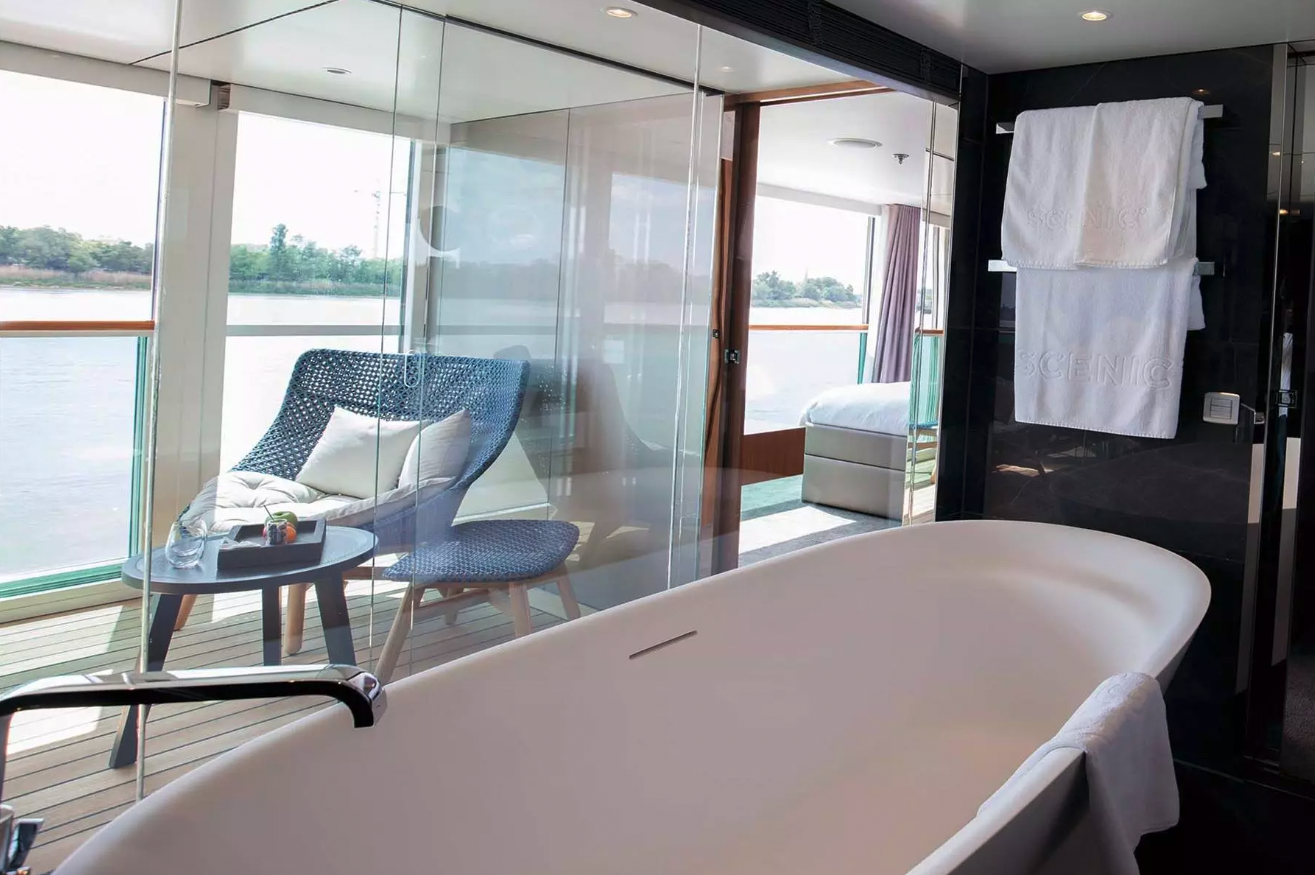
These Suites on the Diamond Deck are the ultimate in luxury with more space (315ft²), impeccable service, thoughtful touches, an outdoor balcony, lounge area and an oversized bathroom.
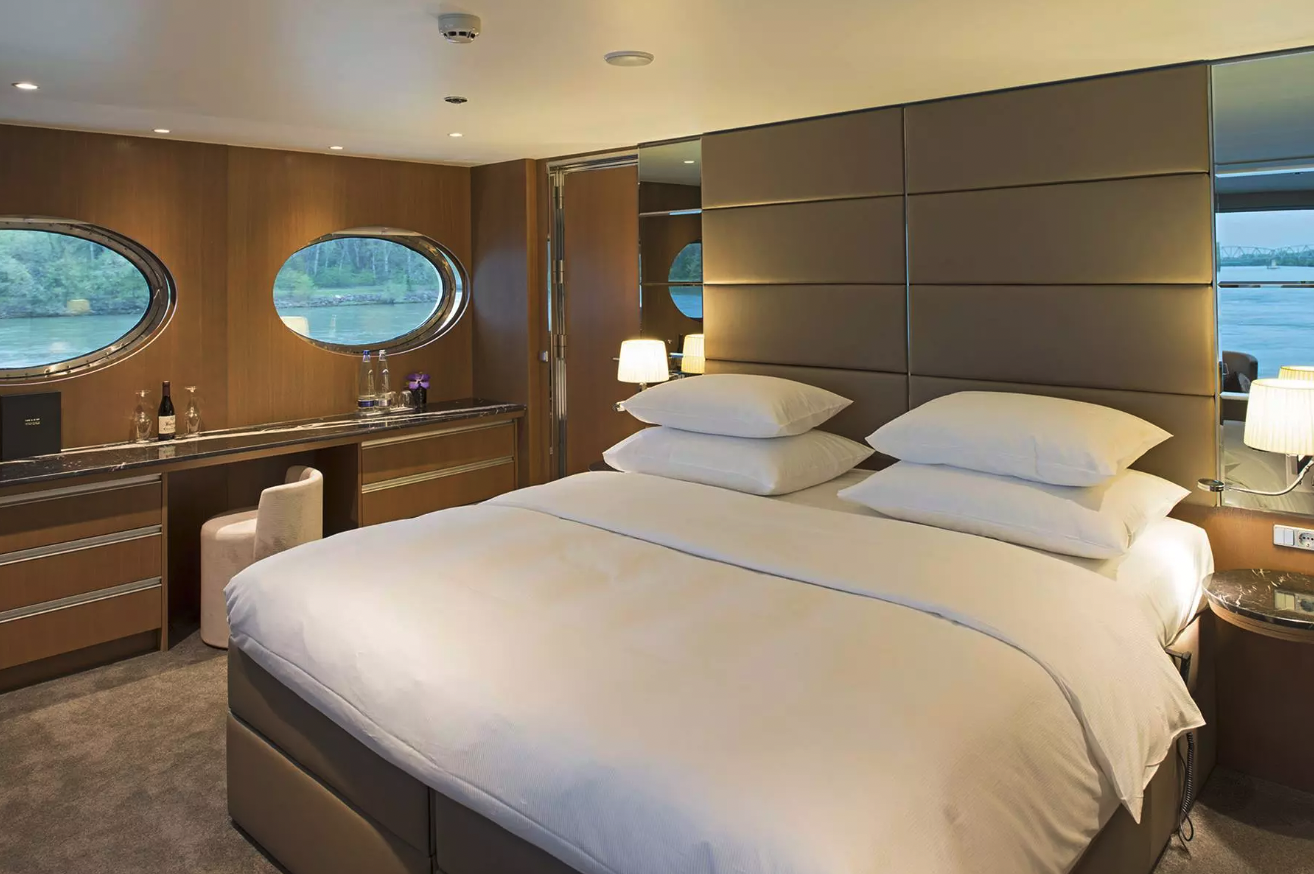
At 325ft², these are the largest suites on the ship. Located on the Diamond Deck, both suites enjoy fantastic views of the passing scenery from your private balcony complete with Scenic Sun Lounge. Each Suite has a lounge area and a luxurious bathroom.
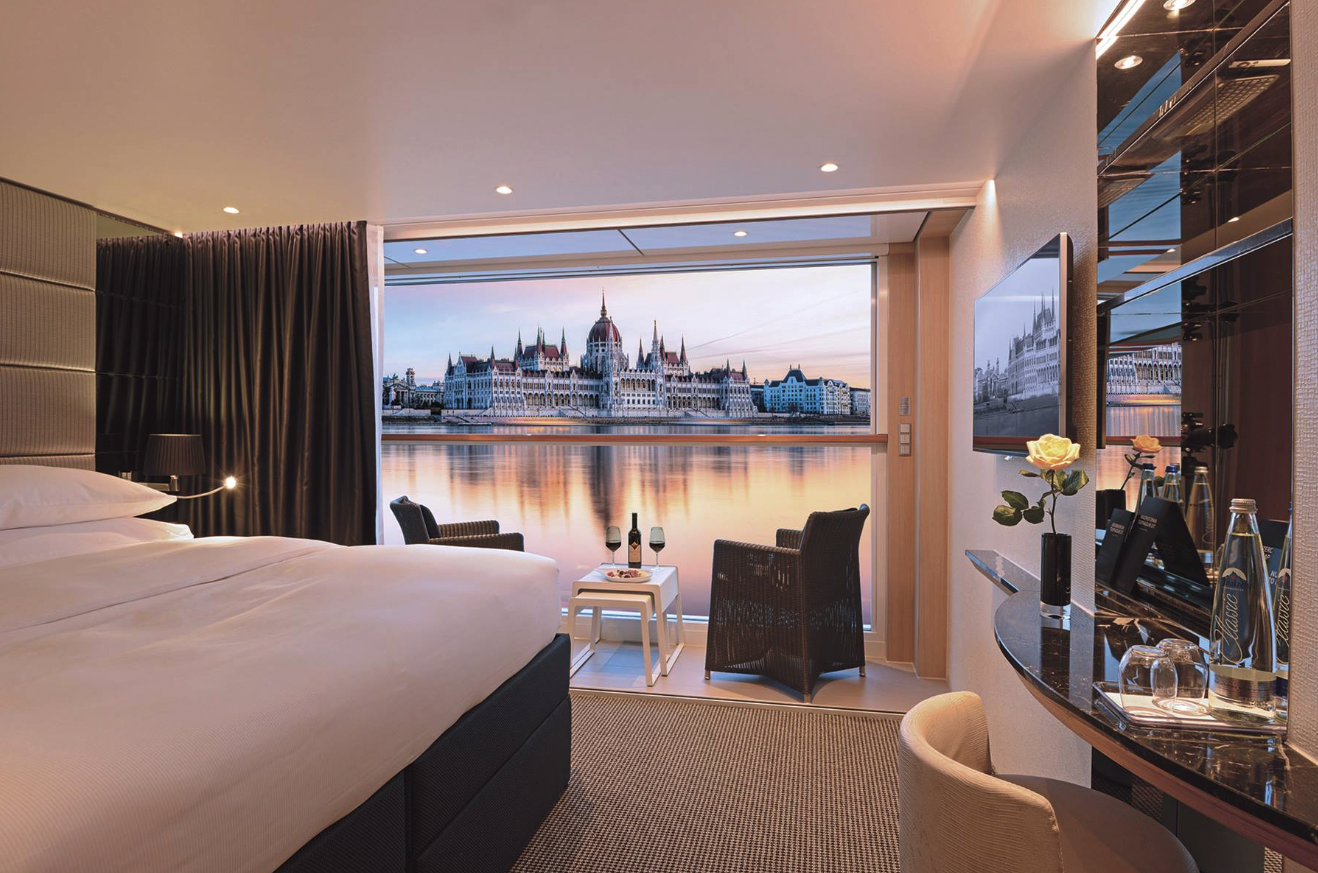
Located on the Sapphire and Diamond Decks these stylishly decorated suites feature a full-length outdoor balcony with the exclusive Scenic Sun Lounge and offer private bathrooms with a luxurious vanity basin and shower.
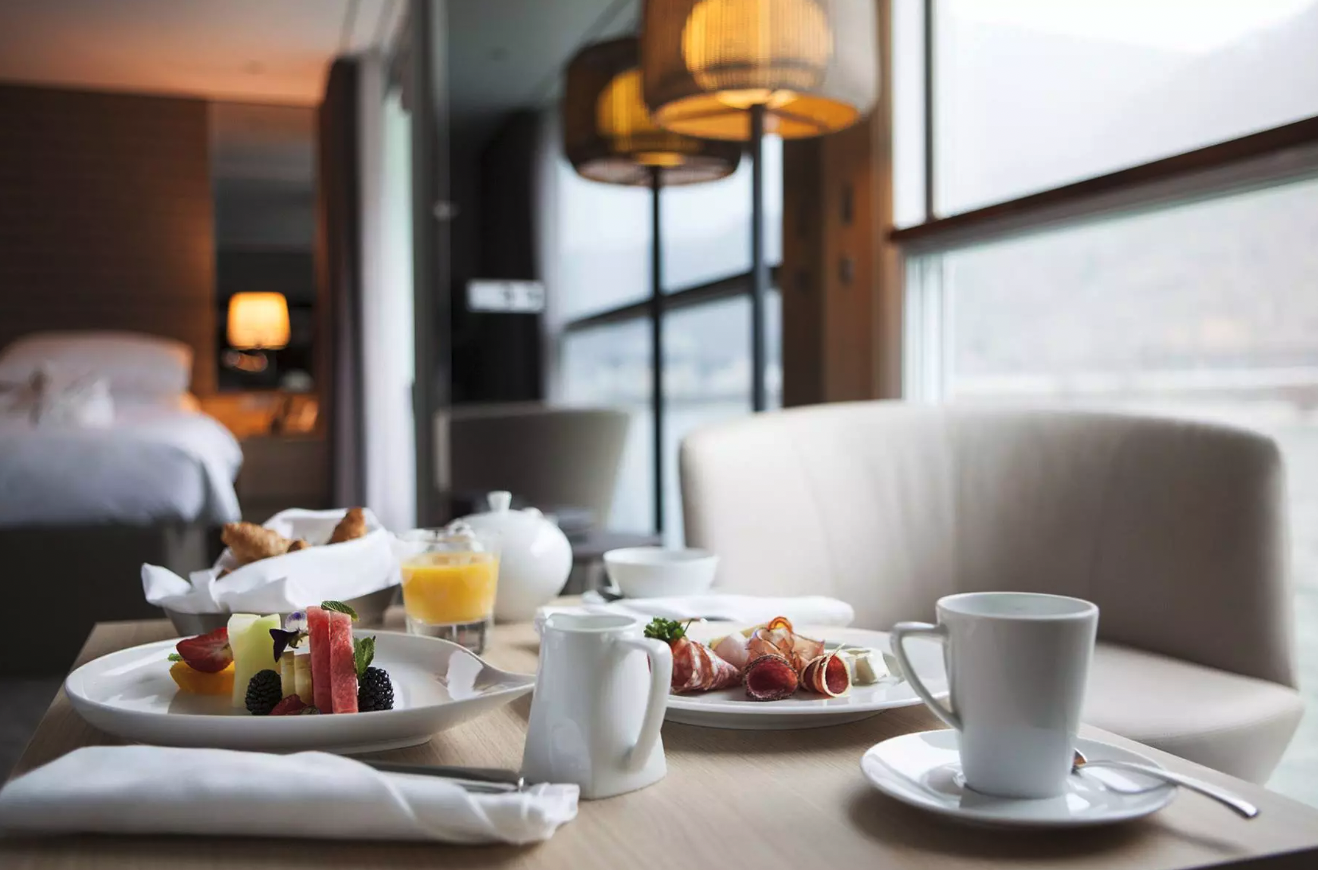
These Suites located on the Diamond Deck are the ultimate in luxury with more space, impeccable service, thoughtful touches, an outdoor balcony, lounge area and an oversized bathroom.

Located in prime locations at the front of the ship on both the Sapphire and Diamond Decks, they offer all the features of our private Balcony Suites with our ingenious Scenic Sun Lounge, but with even more space to relax.

These spacious Suites, located on the Sapphire and Diamond Decks, have a private full-length balcony complete with a Scenic Sun Lounge and elegant en-suite bathrooms featuring a large vanity basin and shower.
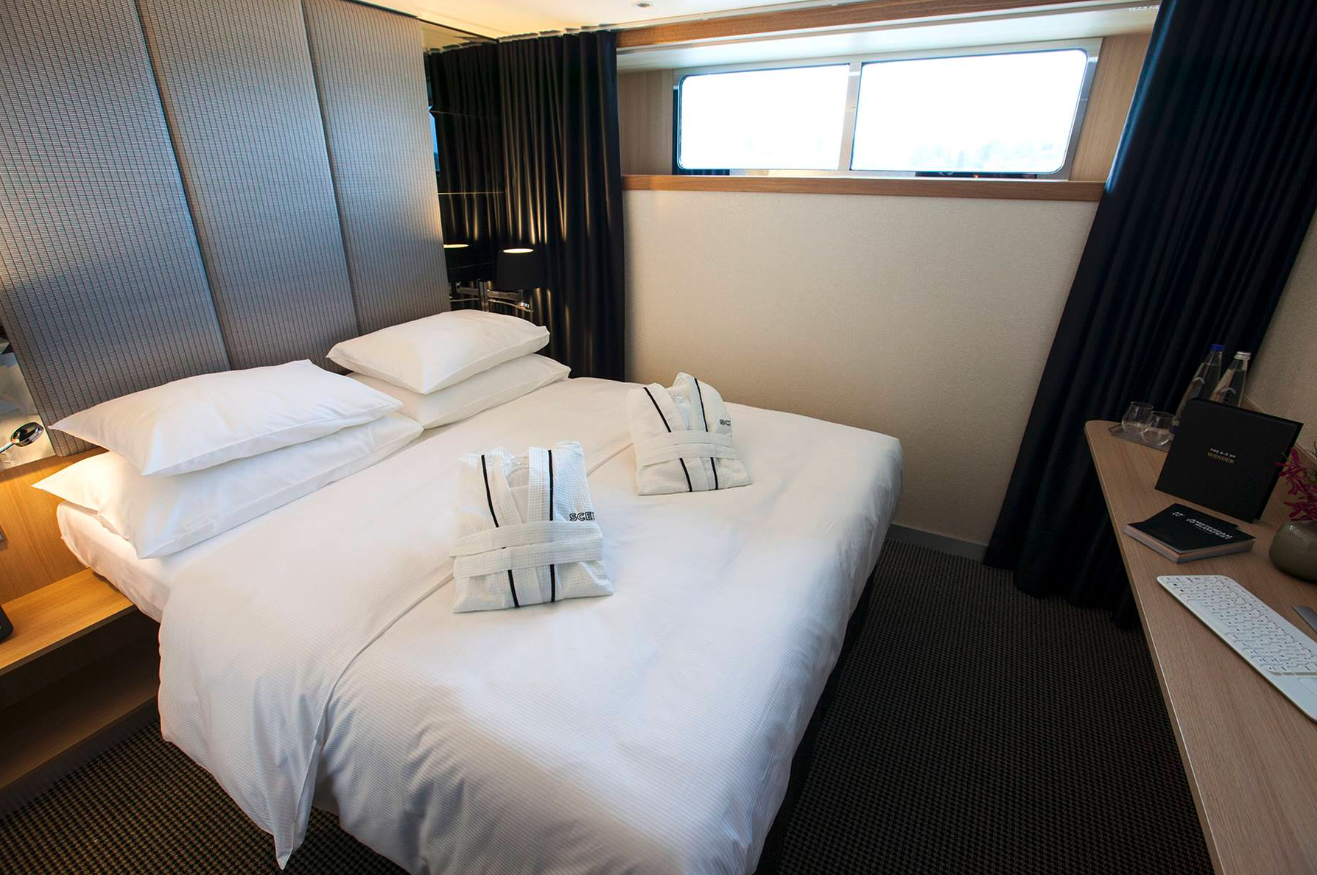
Staterooms are located on the Jewel Deck with large picture windows to ensure a great view. They have a spacious design and clever layout alongside all the usual luxurious amenities and furnishings.
The bedroom area has a Queen-size Scenic ‘Slumber bed’ with Egyptian cotton linen and pillow menu. The bathroom with shower, is well stocked with L’Occitaine toiletries as well as a hairdryer, bathrobes and slippers. The suite also contains a complimentary in-suite mini-bar, restocked daily. The suite has a Flat screen HDTV linked to Mac Mini, complementary WiFi and use of a telephone. A safe is also provided for your valuables.
Guests staying within this suite receive butler service that includes valet and shoeshine service, drinks and cocktails.
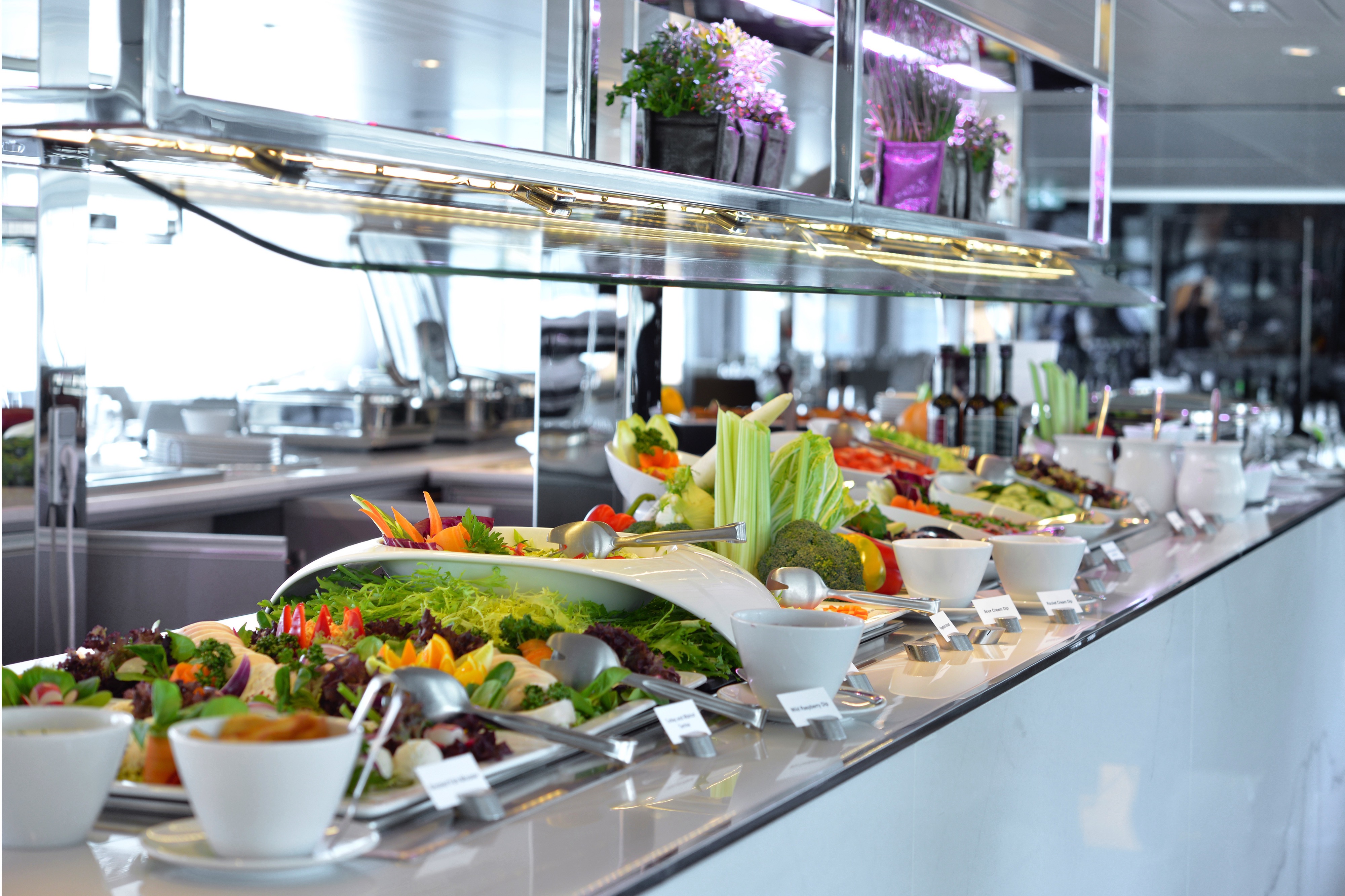
Our spacious main restaurant serving breakfast, lunch and dinner. Award-winning Chefs prepare buffet, while regional wines are hand picked by our sommelier.
- Á la carte menus
- Four-course dinner
- Open seating with tables from 2 to 8
- Wide range of cuisine from local specialties to a Seafood Gala evening
- Buffet and á la carte menus available daily
- In-room dining served by a butler
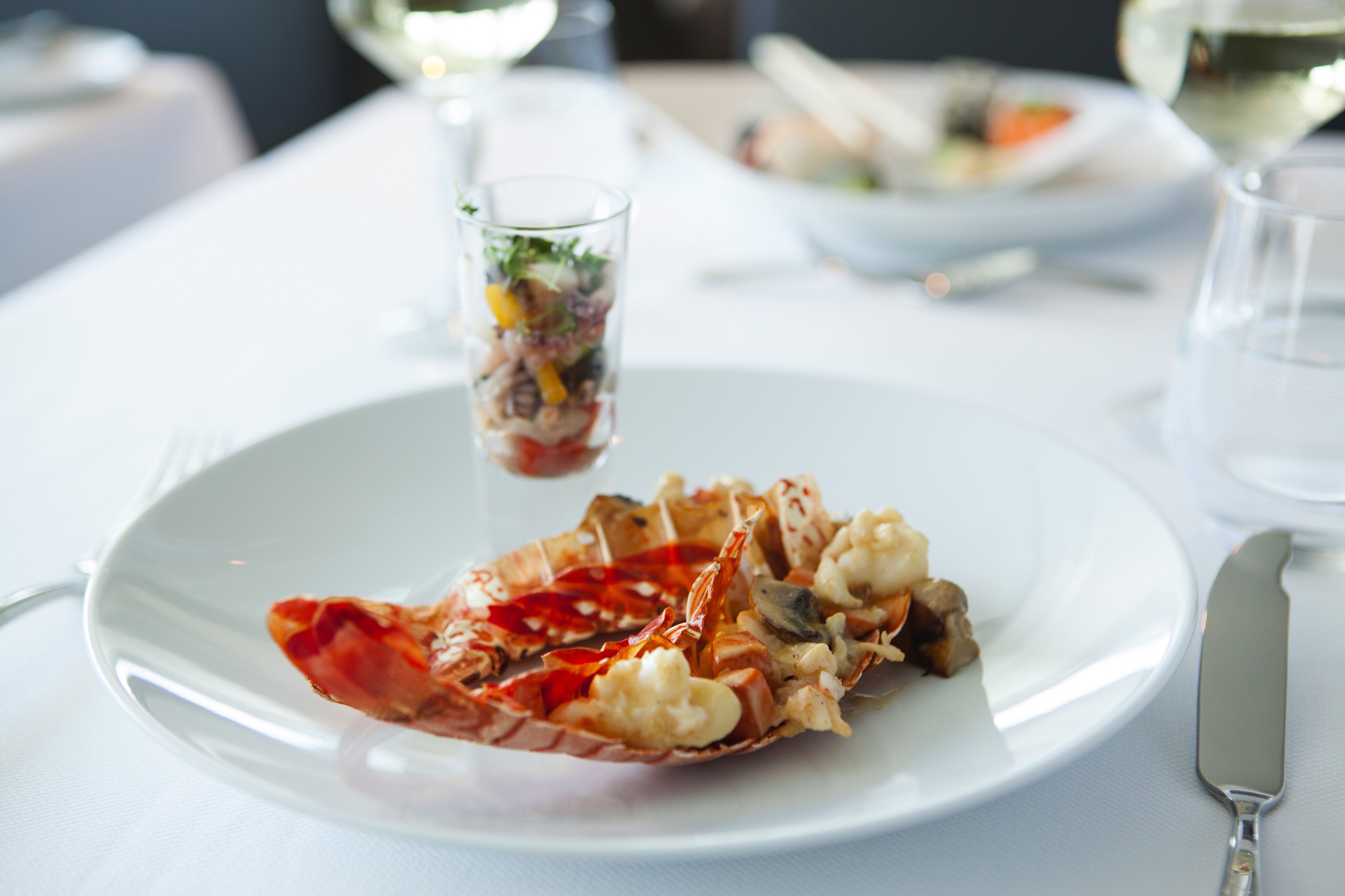
Exclusive and intimate, Portobellos boasts the best vantage point at the front of the ship showcasing sumptuous regional specialities from the freshest local produce.
- Authentic Italian, French or Portuguese dining
- A maximum of 32 guests an evening
- All guests will dine here at least once during their cruise
- Five-course menu featuring regional specialties paired with local wines from the region’s best wineries
- Floor-to-ceiling windows to enjoy the view as you dine
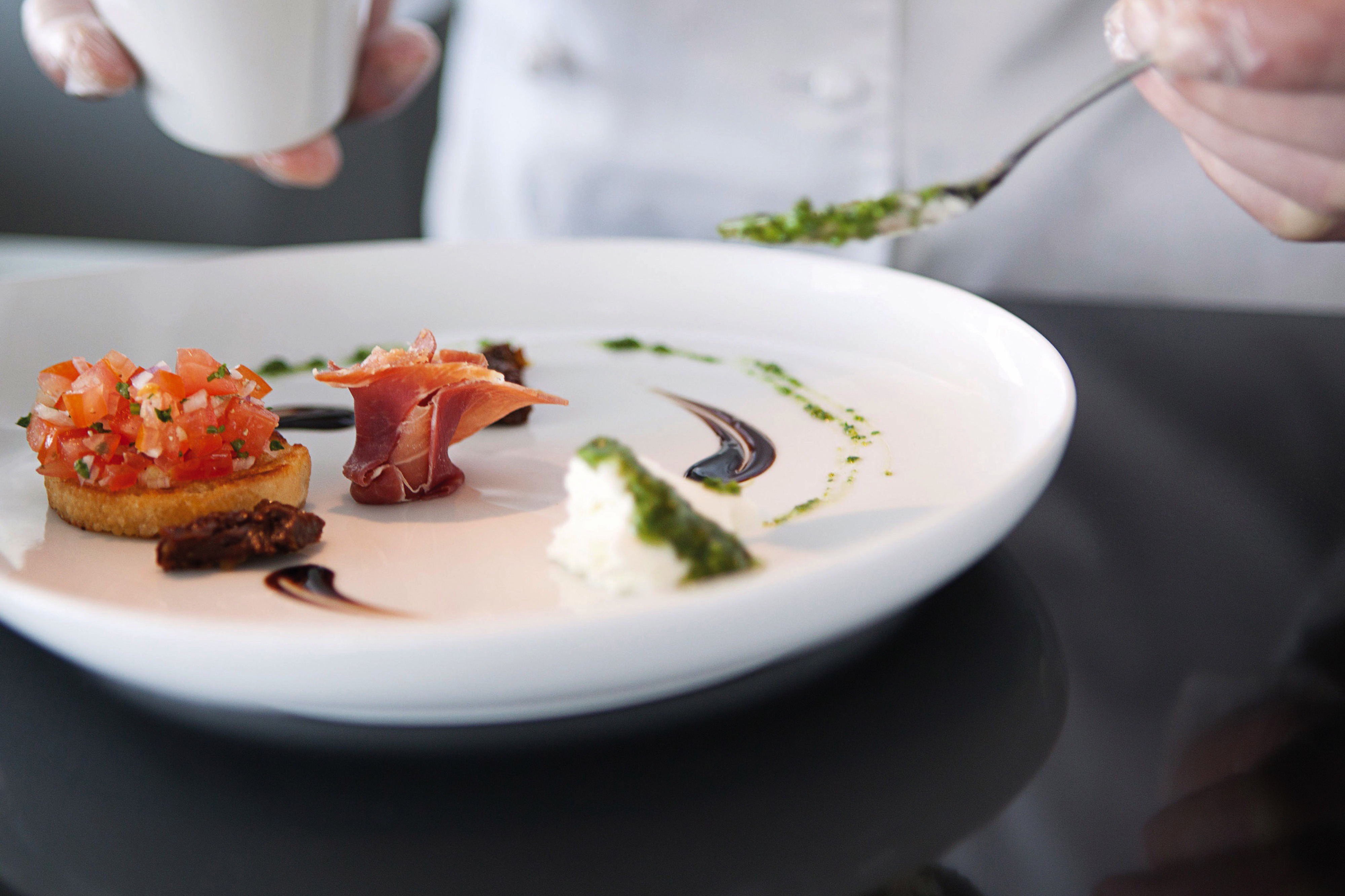
This intimate affair is the ultimate treat for your palate.
Royal and Junior suite guests as well as Diamond Deck guests are invited, by our Executive Chef, to join Table La Rive for an evening of sumptuous dégustation.
- Exclusive for Royal and Junior suite guests on cruises of 7 nights or less, and for all Diamond deck guests on cruises of 10 nights or longer
- Six-course dégustation menu with sommelier paired wines
- Intimate dining for only 10 guests per evening
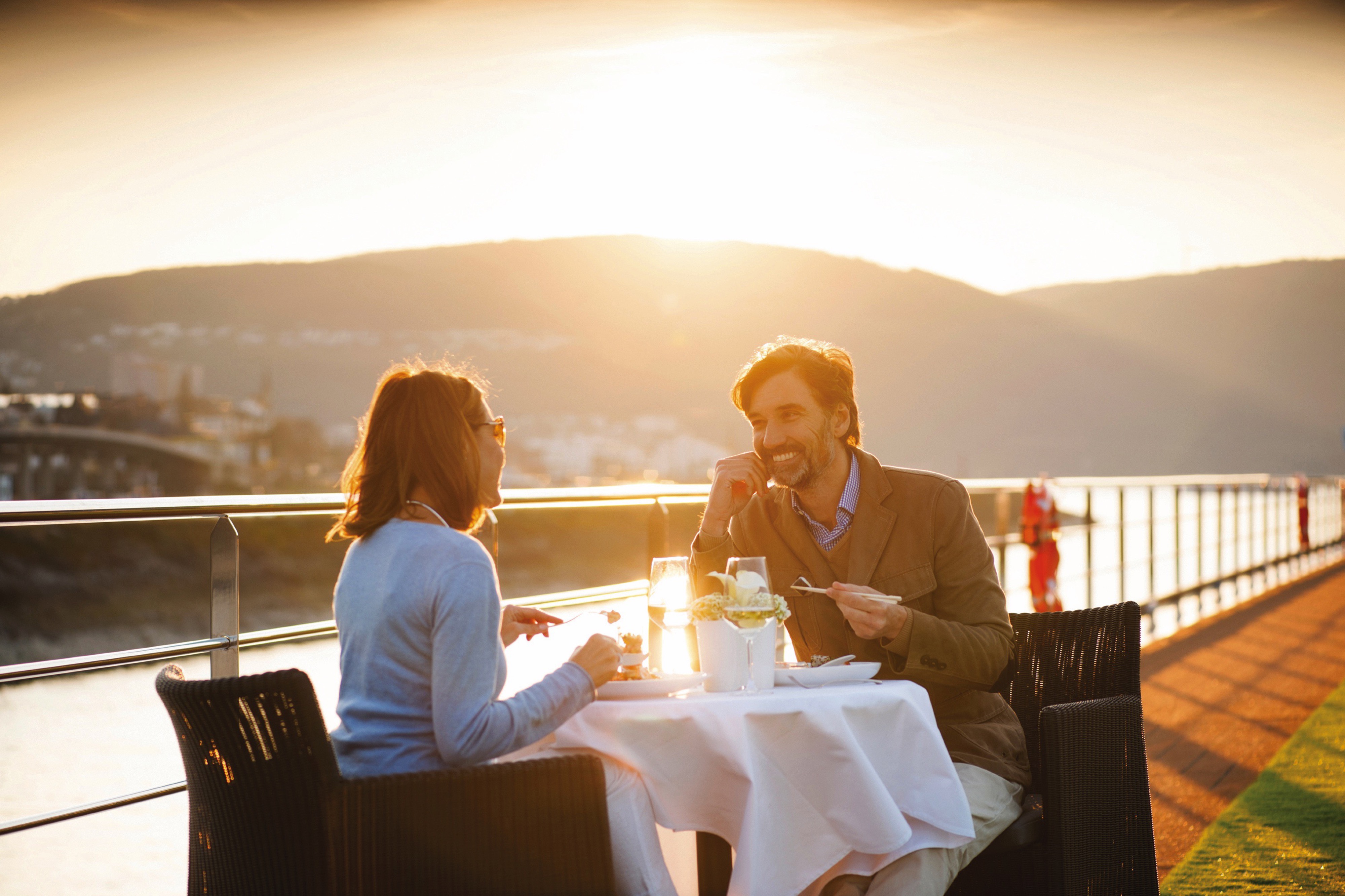
Enjoy a refreshing afternoon aperitif or pick-me-up light bite on the Riverview Terrace, an open-air lounge and bar area located on the Sun Deck. Alfresco living doesn’t get better, with all-inclusive refreshments to complement the rapturous views.
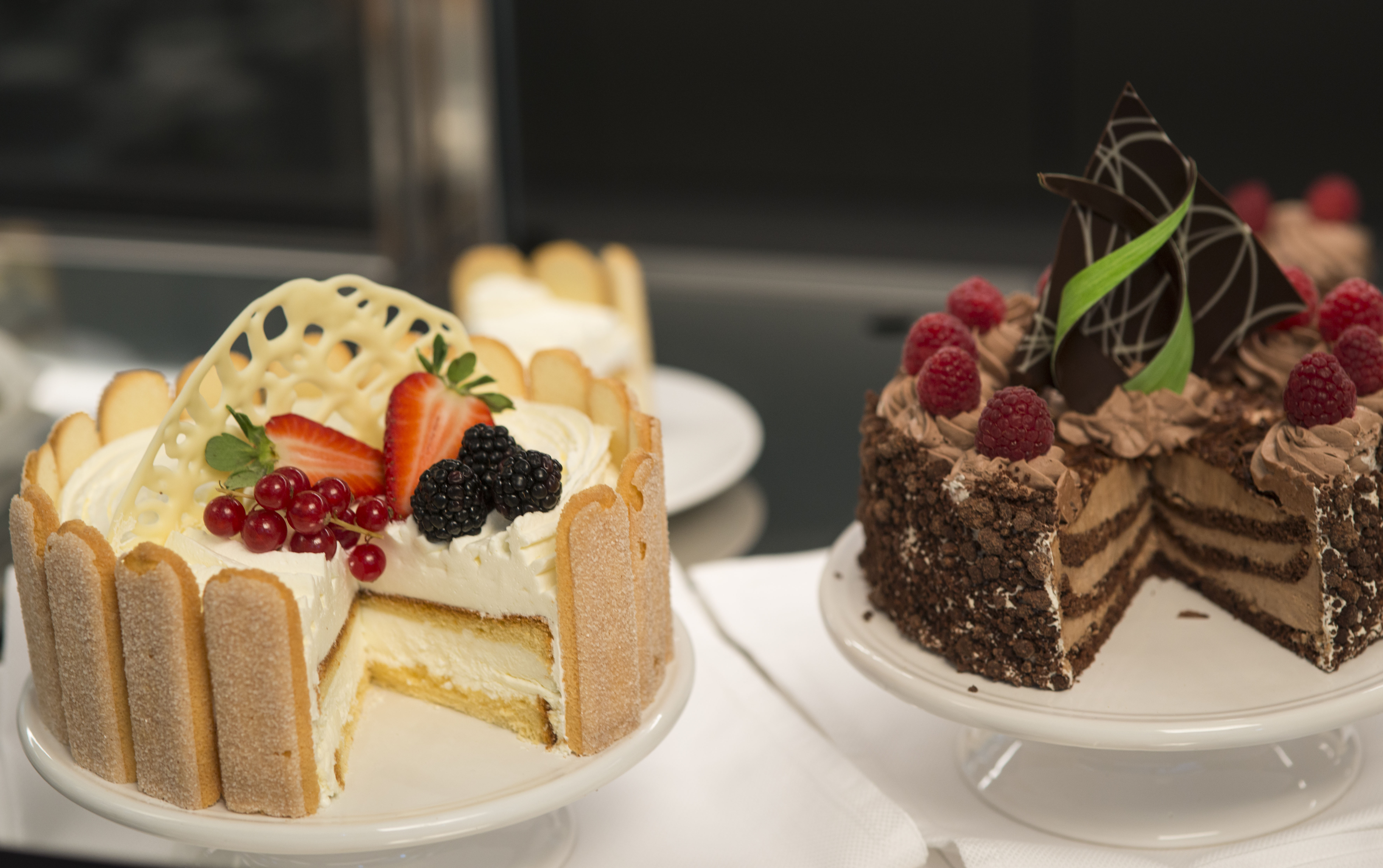
The River Café provides you with a wonderful range of complimentary delicious light meals, snacks and refreshments that you can take anywhere at any time.
- Open from early in the morning until late afternoon
- Casual and flexible dining options to suit your schedule
- Offers full service and mouth-watering buffet style food
- A great meeting spot, open for all day grazing and socializing
- Gelato bar, light snacks, healthy options, tasty treats
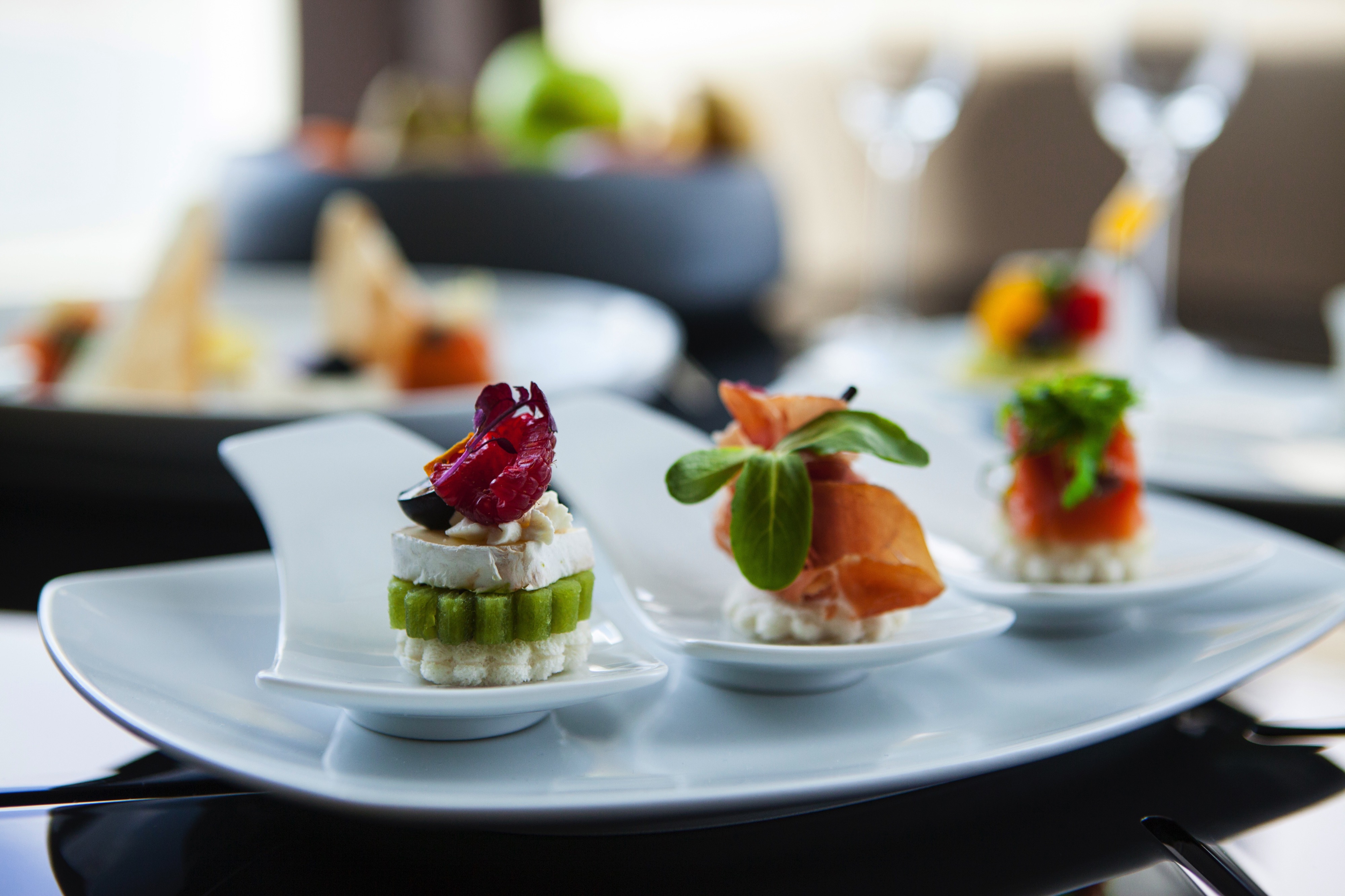
- Dine in the comfort of your suite enjoying the views
- Room service is available, and included throughout your cruise
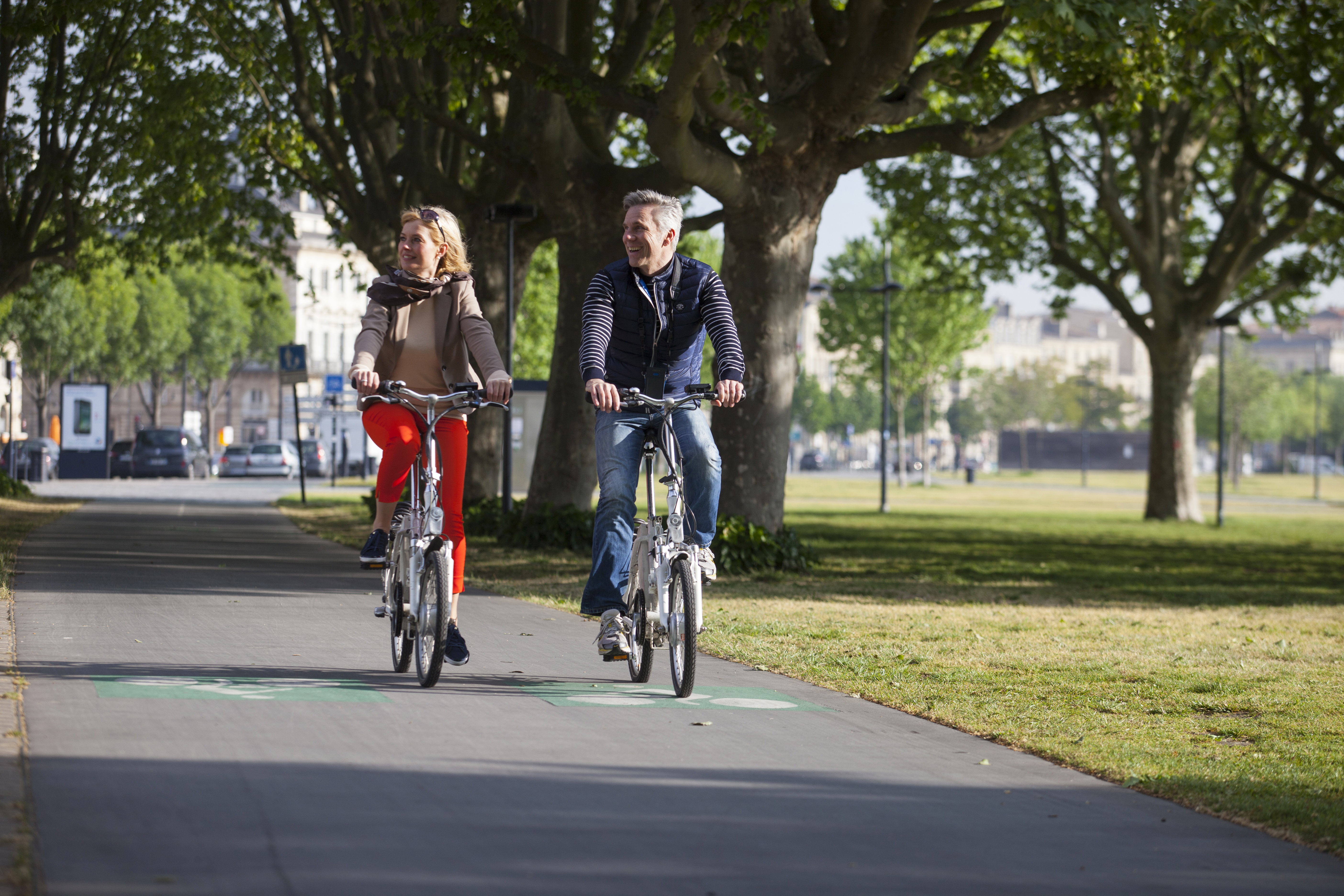
Take a ride on a Scenic E-Bike and experience the wonders of Portugal like never before. These power-assisted bicycles are perfect for seeing the sights at a pace that suits you.
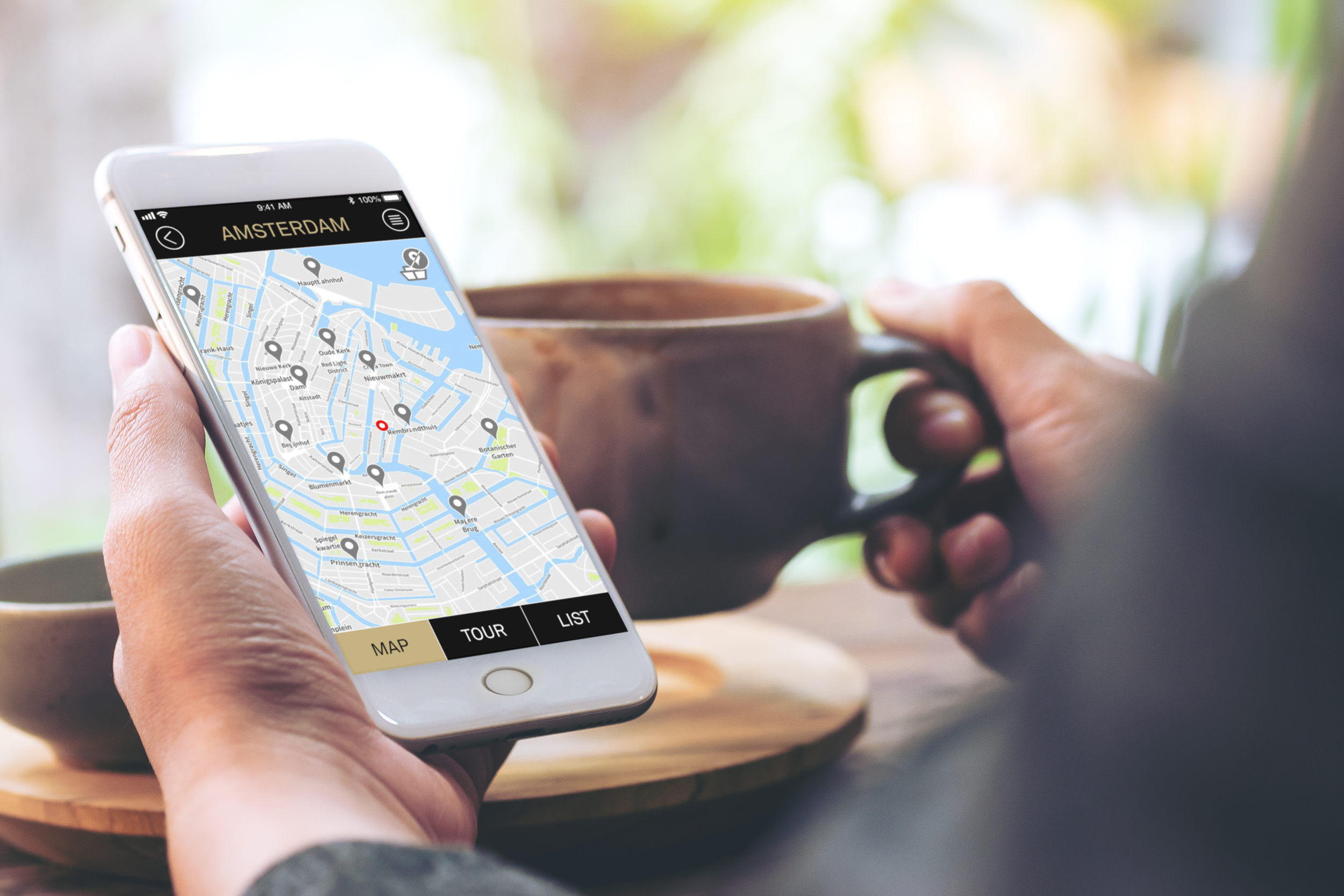
Immerse in the wonders of Europe with Scenic Tailormade, a GPS-powered discovery system, which can be downloaded from The App Store or Google Play, lets you see more of the continent both on board and on shore.
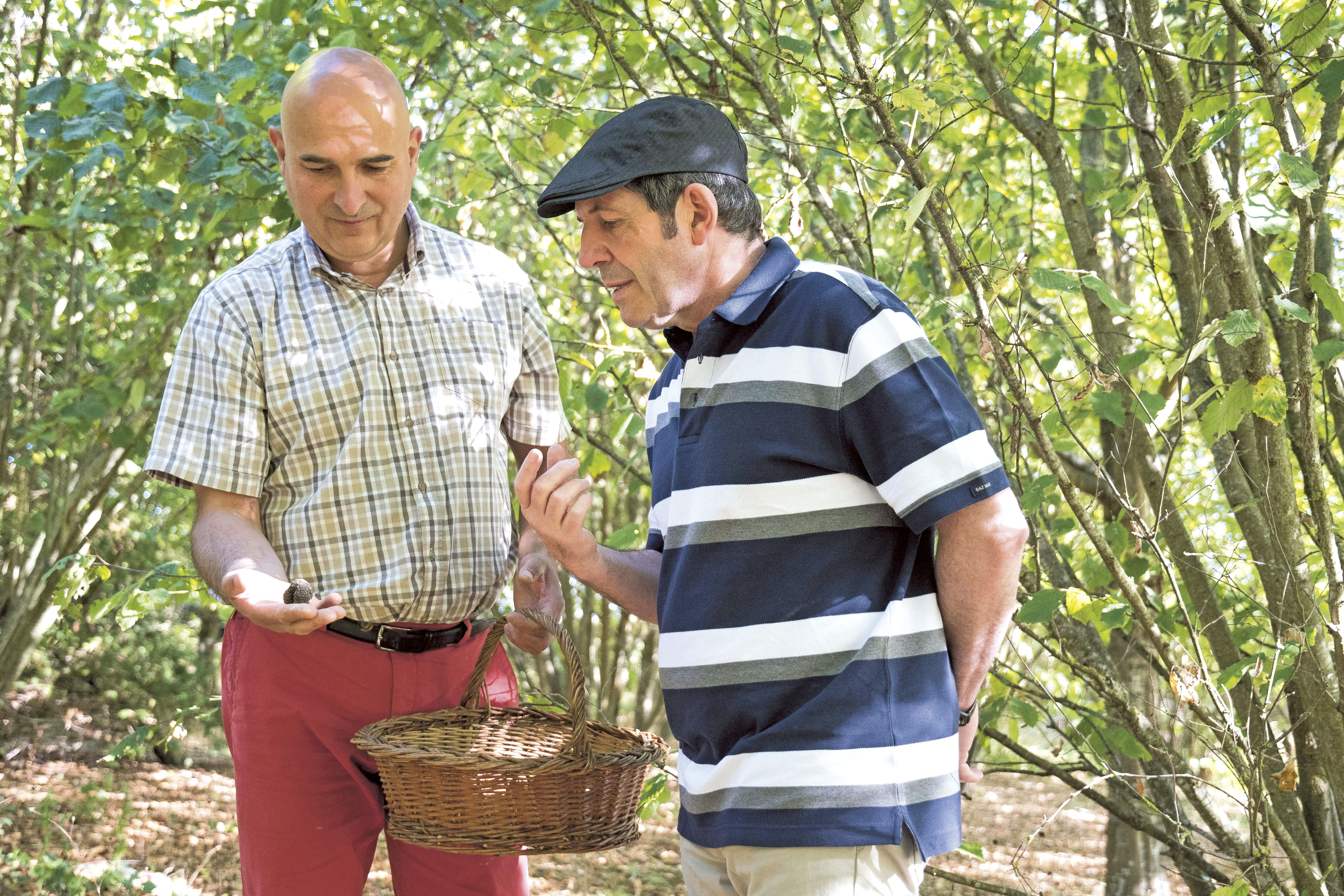
Enjoy the freedom of customising your holiday your way with Scenic Freechoice. Choose from a wide range of truly all-inclusive experiences classified into ‘Active’, ‘Moderate’, and ‘Relaxed’ grades, and find the ones to match your pace each day.
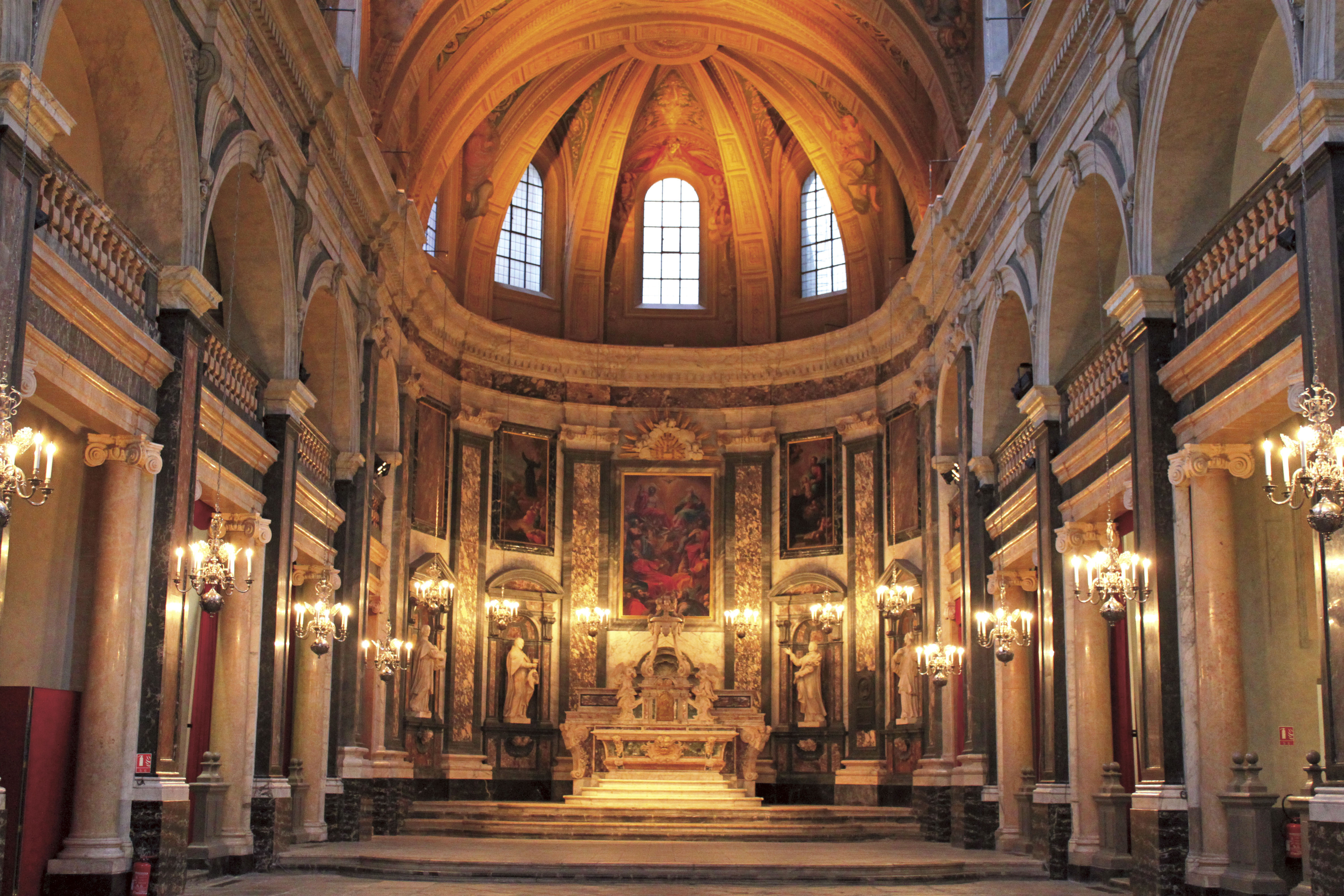
Enjoy wondrous moments exclusively created for you, ranging from a private concert in a grand 18th century palace in Germany or indulging in a sumptuous dinner in a local home in the Netherlands. Enjoy these exquisite handcrafted experiences that are not available to the regular traveller.
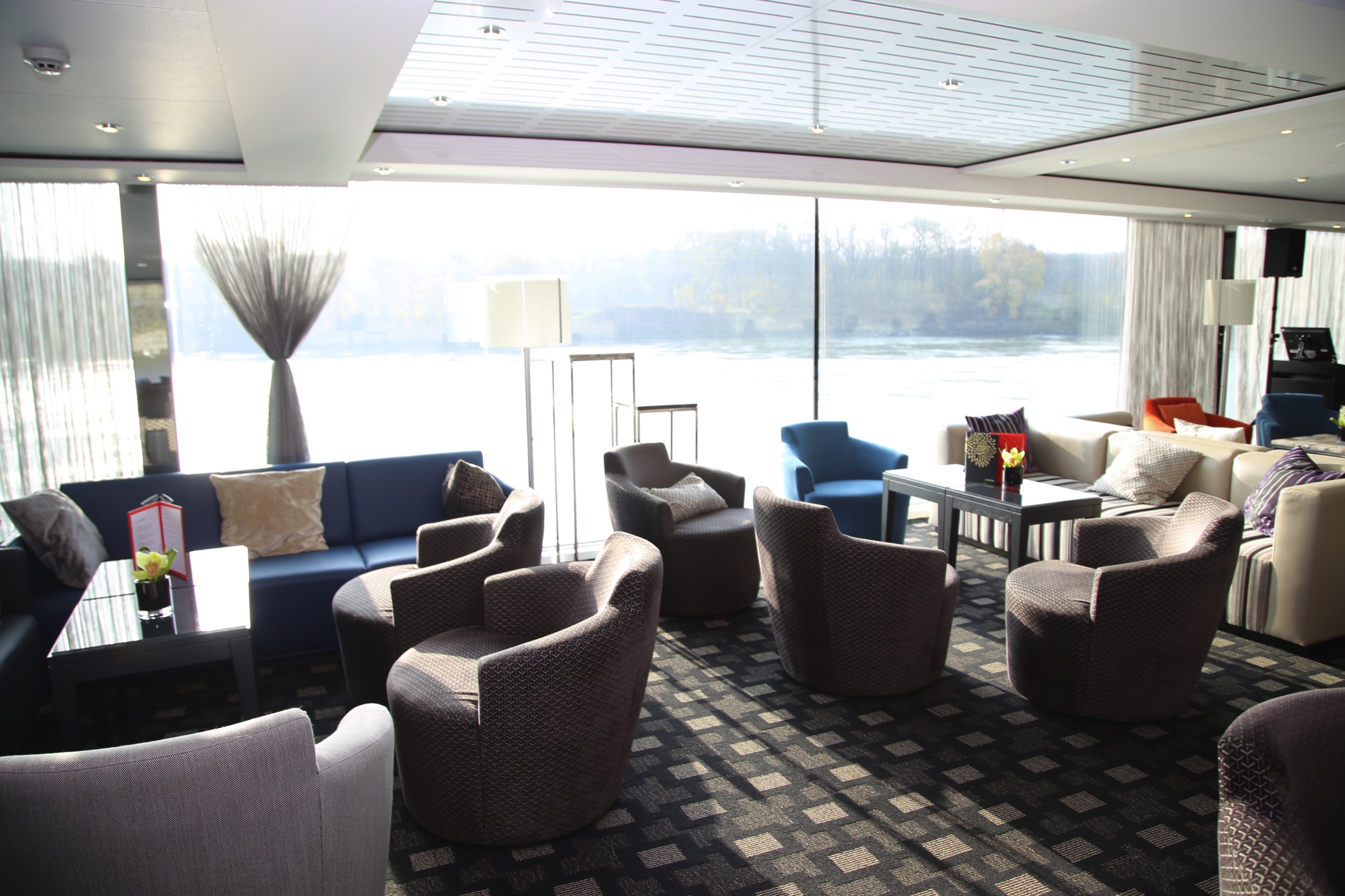
The Panorama Lounge is the main bar area on board the Scenic Crystal, Jade and Jewel. Here, you can explore our extensive bar menu, which is complete with premium wines, beers and spirits, whilst enjoying a programme of entertainment from local musicians, dancers and performers.
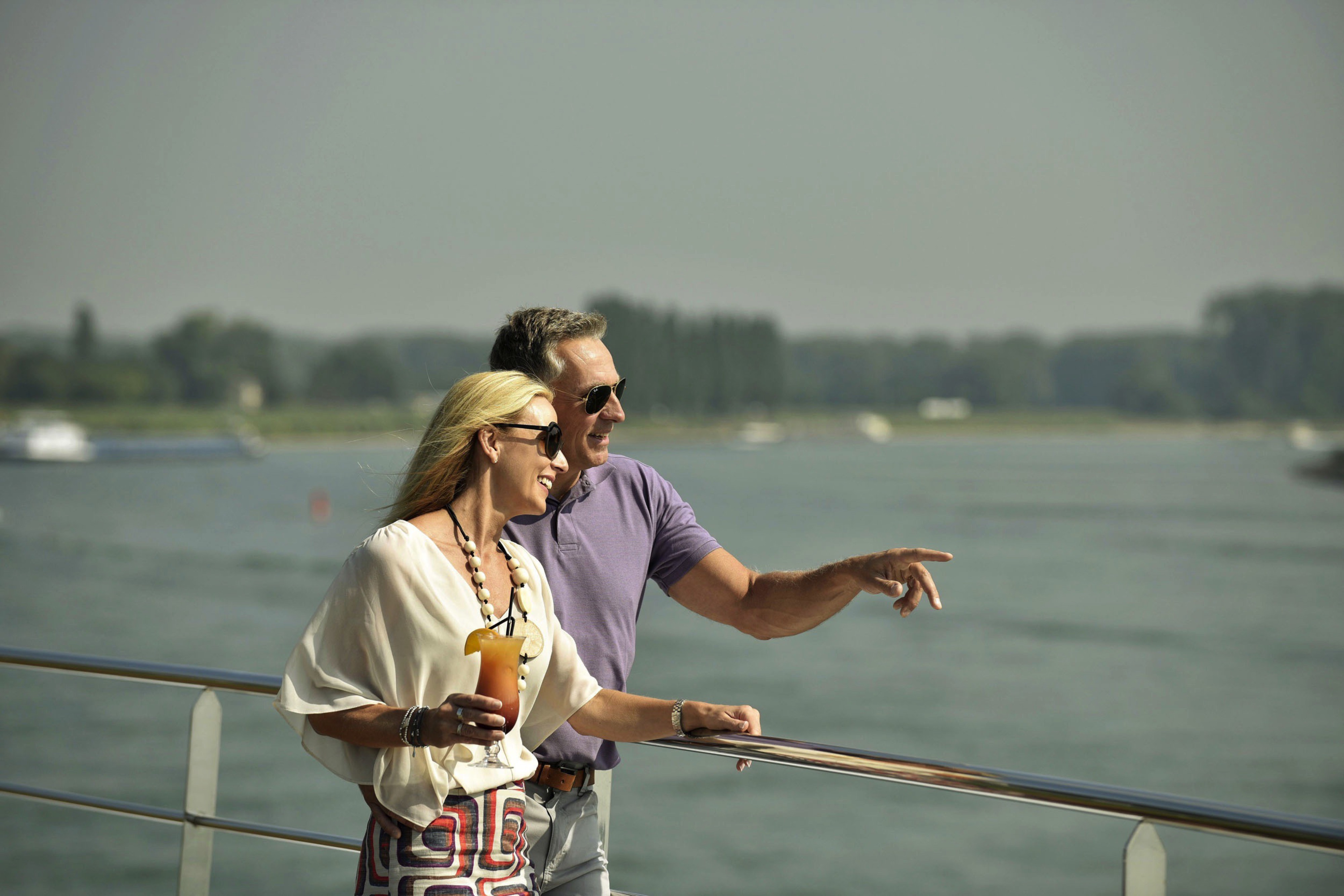
Ideal for those sunlit days on the river, the Sun Deck is a designated open-air space equipped with everything you might need to relax and enjoy the great outdoors on your river cruise – think deck chairs, games area and a bar where you can make the most of our all-inclusive service.
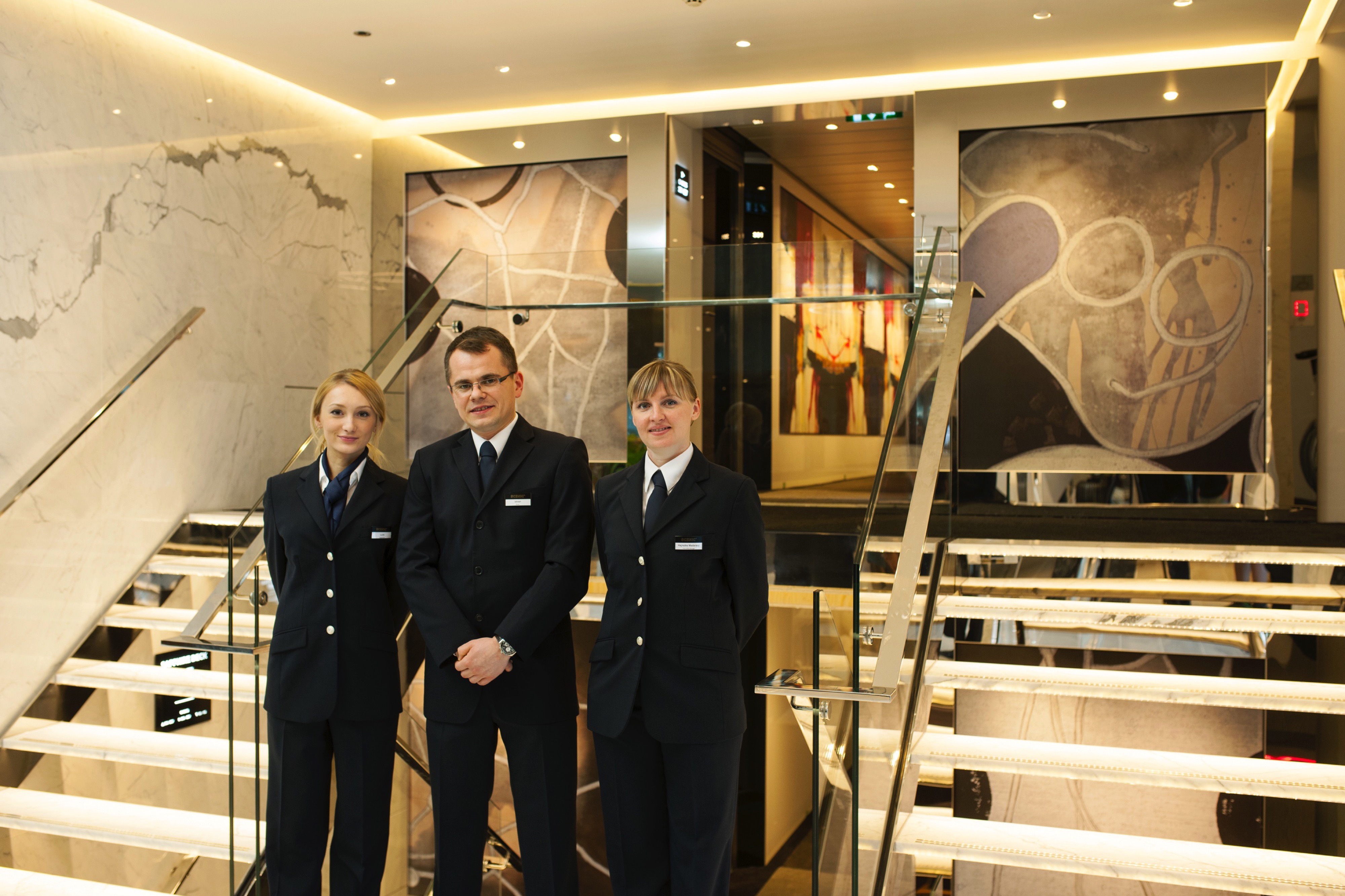
Whatever you need on your cruise through Europe, our welcoming reception team is here to ensure your trip goes down without a hitch. The reception area is also the meeting point for the day’s shore excursions; you’ll find it in the middle of the Scenic Jade.

The Wheelhouse is where our expert crew pilot your Space-Ship, negotiating the twists and turns of the Danube with the utmost precision and care. Stop by to chat with the team and take a peek behind the scenes.
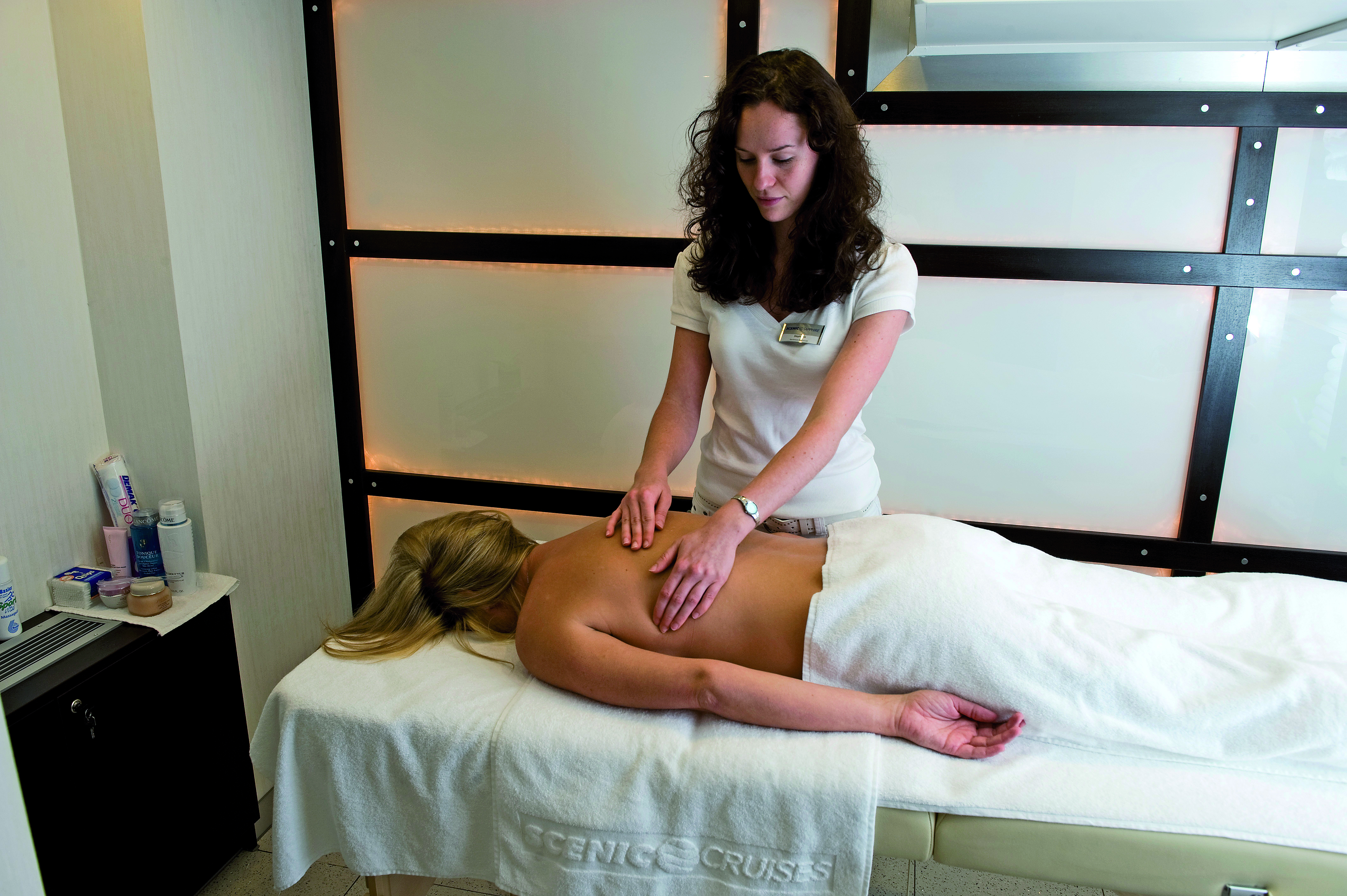
Feel pampered throughout your river cruise at the Wellness Area. From facials to massages, our beauty therapist provides a selection of indulgent treatments to help you truly relax.
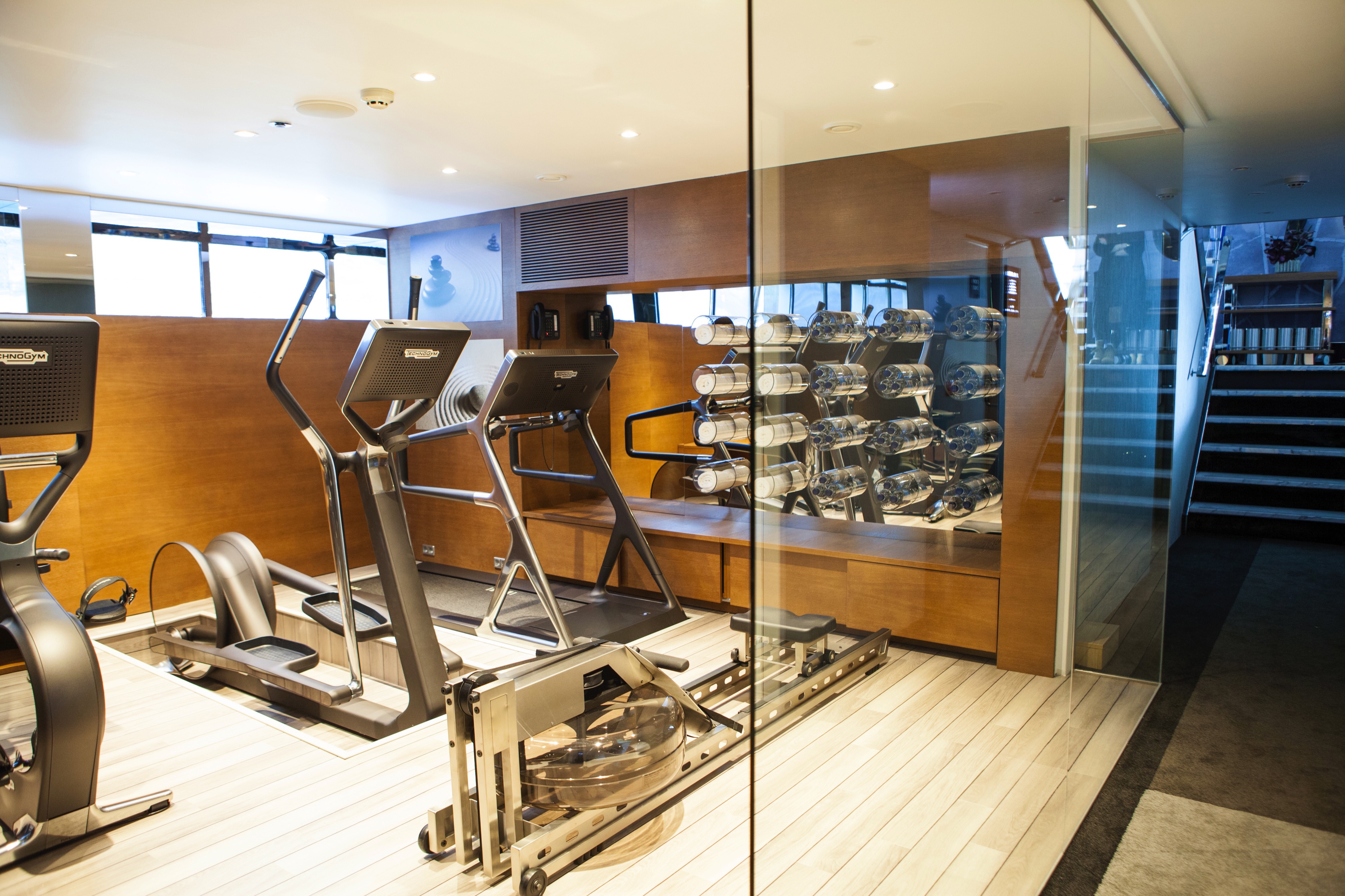
Featuring state-of-the-art fitness equipment, including both cardio and weight-training machines, the Fitness Centre is ideal for those who want to stay active on their travels. Drop by and get ready for the day.

Relax and unwind with a unique wellness session at our Salt Therapy Lounge. New to the Scenic Crystal, Jewel and Jade, this purpose-built therapy space uses the natural healing power of salt to help you relax, promoting improved wellness and sleep.
Casual and comfortable during the day. In the evening dress is semi formal or business casual and casual elegance for ladies. For gentlemen a jacket and tie are requested for the Captain’s Dinner.
Travellers who are less than 21 years old on the departure date must be accompanied by and share a cabin/room with an adult aged 21 or over. Children under 12 years of age are not accepted. This is a condition of carriers and cruise operators.
Scenic accommodate special dietary requirements to the best of our ability across our river and ocean cruises, and escorted tours. If you have special dietary requests, please notify us at the time of booking and inform your Cruise Director when you arrive.
Please note: while we endeavour to accommodate all dietary requirements, special requests are not guaranteed and failure to meet any request is not breach of contract on our behalf.
Complimentary Wi-Fi access is available on board some of our vessels. Please be aware that internet access may be limited or none existent at certain times due to high demand from other users, or proximity to telecommunication services. We cannot guarantee that you will have full Wi-Fi coverage in your suite.
If you are travelling on an escorted tour, please note that Wi-Fi is available at selected hotels only.
Scenic Space-Ships do not carry medical personnel on board and immediate medical attention cannot always be guaranteed. However, our staff are trained in first aid, and can provide basic medical assistance. Should you need to call medical services, this will be at your own expense. Please be aware that we cannot provide personal escorts for medical visits.
Smoking is not permitted in suites or any other indoor area across the Scenic fleet.
Smoking is permitted in specific areas of external decks. However, we cannot guarantee that these facilities will always be available.
There are no specific pieces of clothing we insist you pack, however we can offer pieces of advice, based upon your itinerary. We recommend comfortable walking shoes for sightseeing, as well as any garments, such as hats, gloves and water-resistant jackets, which will help you to stay comfortable whatever the weather. The dress code across all Scenic cruise and tour itineraries is casual and comfortable. Dinner attire is smart casual — open-neck shirts, trousers and dresses; you may wear a jacket or blazer with a tie but it is not required.
The on board language is English. All staff, crew and tour guides speak English, and all announcements and lectures will be made in English.
Scenic Enrich | Enjoy wondrous moments exclusively created for you, ranging from a private concert in a grand 18th century palace in Germany or indulging in a sumptuous dinner in a local home in the Netherlands. Enjoy these exquisite handcrafted experiences that are not available to the regular traveller.
Scenic Freechoice | Enjoy the freedom of customising your holiday your way with Scenic Freechoice. Choose from a wide range of truly all-inclusive experiences classified into ‘Active’, ‘Moderate’, and ‘Relaxed’ grades, and find the ones to match your pace each day.
Expert Local Guides | Nobody knows a place like those who live there. Explore the highlights and the hidden gems of your destination through the expert and passionate eyes of a local and take comfort in knowing you’re in good hands.
E-bikes | Enjoy the flexibility of our electrically-assisted bikes to explore your destination with minimal pedalling.
Scenic Tailormade App | Our exclusive app is the perfect accessory for independent exploration. Select between CityTour and Riverview modes to enjoy effortless self-guided touring.
Return Airport Transfers | Enjoy seamless included return airport transfer at the end of your trip.
Spacious Suites | Scenic Space-Ship suites offer you the luxury of space. Our suites are some of the largest on Europe’s rivers. Relax in the signature Scenic Sun Lounge providing you with your very own window to the world in all our Balcony Suites.
Up to five dining options | With an array of dining options, you can sample new cuisines and a different meal each day on your relaxing river cruise. From casual to fine dining, you will experience fresh local produce and a taste sensation for every occasion.
Complimentary beverages | Whether relaxing by the pool accompanied by a refreshing cocktail, or a nightcap for a good night’s sleep, enjoy our range of unlimited complimentary premium beverages all day, every day.
Butler service | Need your shoes shined, breakfast sent to your suite or laundry done? Consider it done. Our all-day butler service will ensure you have everything you need for a relaxing holiday.
Complimentary mini-bar | The mini-bar in your room will be restocked daily with all your favourite alcoholic and non-alcoholic drinks and snacks, customisable to your taste.
Wellness area and fitness area | Stay in your best shape while on board with our fitness centre and wellness zone. Enjoy the healing benefits of the Salt Therapy Lounge known to improve respiratory conditions and immunity.
Cruise Director | Our expert Cruise Directors are your storyteller, historian, guide, and friend rolled into one. From helping you set up your Tailormade App to directing you to the nearest golf course, you can count them to address your every need.
Complimentary Wi-Fi | Stay in touch with your family and friends no matter where you set sail to with our complimentary on board Wi-Fi.
All tipping and gratuities | We’ve included all your tipping and gratuities for the entire cruise so you can lock away your wallet and simply enjoy the truly all-inclusive experience.

- Riverview Terrace
- Wheelhouse
- Sun Deck
- Walking Track

- Panorama Deck
- Portobellos Restaurant
- River Cafe
- Panorama Lounge and Bar
- Gift Shop
- Reception
- Royal Panorama Suite RS
- Balcony Suite PA & PP
- Royal Balcony Suite RA & R
- Deluxe Balcony Suite PD
- Junior Balcony Suite RJ
- Royal Owner’s Suite RO

- Galley
- Table La Rive
- Crystal Dining Restaurant
- Junior Balcony Suite BJ
- Deluxe Balcony Suite BD
- Balcony Suite BB, BA, & C
- Single Balcony Suite BS

- Wellness Area
- Fitness Centre
- Salt Therapy Lounge
- Standard Suite Cat D
- Standard Suite Cat E

